Carsten SchulteDies ist keine offizielle Homepage von Carsten Schulte, E-Mails an Carsten Schulte sind hier nicht möglich! |
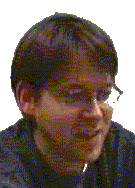 |
 11 Bücher von Carsten Schulte
11 Bücher von Carsten Schulte 

Lehr- Lernprozesse im Informatik-Anfangsunterricht
Theoriegeleitete Entwicklung und Evaluation eines Unterrichtskonzepts zur Objektorientierung in der Sekundarstufe II
(Carsten Schulte) (2003)


3. Workshop der GI-Fachgruppe 'Didaktik der Informatik'
19.-20. Juni 2006 an der Universität Potsdam
(Andreas Schwill, Carsten Schulte, Marco Thomas) (2006)


Grundsätze und Standards für die Informatik in der Schule
Bildungsstandards Informatik - Entwurfsfassung für Empfehlungen der Gesellschaft für Informatik e. V.
(Hermann Puhlmann, Torsten Brinda, Michael Fothe, Steffen Friedrich, Bernhard Koerber, Gerhard Röhner, Carsten Schulte) (2007)



Fachdidaktik Informatik konkret
in Theorie und Praxis mit zahlreichen Beispielen
(Marco Thomas, Carsten Schulte) (2008)
6. Workshop der GI-Fachgruppe DDI
(Ira Diethelm, Christina Dörge, Claudia Hildebrandt, Carsten Schulte) (2010)


10th Koli Calling International Conference on Computing Education Research, Koli Calling '10, Koli, Finland, October 28-31, 2010
(Carsten Schulte, Jarkko Suhonen) (2010)
Proceedings of the 9th Workshop in Primary and Secondary Computing Education, Berlin, Germany, November 5-7, 2014
(Carsten Schulte, Michael E. Caspersen, Judith Gal-Ezer) (2014)
ITiCSE 2015
Proceedings of the 2015 ACM Conference on Innovation and Technology in Computer Science Education, ITiCS 2015, Vilnius, Lithuania, July 4-8, 2015
(Valentina Dagiene, Carsten Schulte, Tatjana Jevsikova) (2015) Bei amazon.de anschauen
Perspectives on Teaching and Learning in School
(Sue Sentance, Erik Barendsen, Carsten Schulte) (2018)


Frühe informatische Bildung - Ziele und Gelingensbedingungen für den Elementar- und Primarbereich
Wissenschaftliche Untersuchungen zur Arbeit der Stiftung "Haus der kleinen Forscher"
(Nadine Bergner, Hilde Köster, Johannes Magenheim, Kathrin Müller, Ralf Romeike, Ulrik Schroeder, Carsten Schulte) (2018)


Perspectives on Teaching and Learning in School (2nd edition)
(Sue Sentance, Erik Barendsen, Nicol R. Howard, Carsten Schulte) (2023)
 58 Texte von Carsten Schulte
58 Texte von Carsten Schulte 
| Jahr | Volltext | Abrufe | Text | Texttyp |
|---|---|---|---|---|
| 1999 | Kooperative Arbeitsplattformen - CSCW-Systeme in Lehr- und Lernkontexten (Carsten Schulte, Harald Selke, Carsten Huth) erschienen in LOG IN 3/4 1999 (Seite 40)  | Journal-Artikel | ||
| 1999 |   |
1, 1, 10, 3, 8, 4, 6, 3, 1, 5, 4, 5 | Dekonstruktion von Informatiksystemen als Unterrichtsmethode - Zugang zu objektorientierten Sichtweisen im Informatikunterricht (Thorsten Hampel, Johannes Magenheim, Carsten Schulte) erschienen in Informatik und Schule (Seite 149 - 164)   | Kapitel |
| 2001 |   |
9, 3, 7, 3, 2, 5, 3, 1, 5, 5, 2, 8 | Informatische Aufgabenbereiche der Medienbildung (Carsten Schulte) erschienen in Informationstechnische Bildung und Medienerziehung (Seite 1 - 16) | Journal-Artikel |
| 2001 |   |
4, 2, 5, 3, 2, 5, 3, 2, 2, 3, 2, 8 | Aufgabenbereiche der Medienbildung im Informatikunterricht (Carsten Schulte, Olaf Scheel) erschienen in Informatikunterricht und Medienbildung  | Konferenz-Paper |
| 2002 |   |
Das Sieben-Schritte-Schema zur Dekonstruktion objektorientierter Software (Carsten Schulte, Ulrich Block) erschienen in Modellierung in der informatischen Bildung (Seite 3 - 12)  | Konferenz-Paper | |
| 2003 |   |
Thinking in Objects and their Collaboration - Introducing Object-Oriented Technology (Carsten Schulte, Johannes Magenheim, Jörg Niere, Wilhelm Schäfer) erschienen in Computer Science Education 4/2003 (Seite 269 - 288) | Journal-Artikel | |
| 2004 |   |
3, 1, 6, 2, 2, 3, 3, 1, 4, 2, 2, 8 | Designing a curriculum (  Johannes Magenheim, Olaf Scheel, Carsten Schulte) Johannes Magenheim, Olaf Scheel, Carsten Schulte) erschienen in Workshop ICT - SATW-tic-EDU 9/04   | Präsentation |
| 2005 |   |
1, 2, 12, 3, 3, 4, 4, 3, 2, 6, 1, 7 | Erwartungen und Wahlverhalten von Schülerinnen und Schülern gegenüber dem Schulfach Informatik - Ergebnisse einer Umfrage (Carsten Schulte, Johannes Magenheim) erschienen in Unterrichtskonzepte für informatische Bildung (Seite 111 - 121)  | Konferenz-Paper |
| 2005 |   |
2, 1, 14, 2, 5, 5, 2, 3, 5, 2, 2, 9 | Beiträge der Objektorientierung zu einem Kompetenzmodell des informatischen Modellierens (Torsten Brinda, Carsten Schulte) erschienen in Unterrichtskonzepte für informatische Bildung (Seite 137 - 148)  | Konferenz-Paper |
| 2005 |   |
1, 3, 11, 2, 1, 4, 4, 1, 5, 10, 1, 10 | Novices' expectations and prior knowledge of software development - results of a study with high school students (Carsten Schulte, Johannes Magenheim) erschienen in ICER 2005 (Seite 143 - 153) | Konferenz-Paper |
| 2006 |   |
Gestaltung von Informatikseminaren unter Einsatz von Videokonferenzen (Carsten Schulte, Marco Thomas) erschienen in Hochschuldidaktik der Informatik (Seite 77 - 88) | Konferenz-Paper | |
| 2006 |   |
1, 1, 4, 3, 1, 6, 2, 2, 4, 3, 1, 4 | What do teachers teach in introductory programming? (Carsten Schulte, Jens Bennedsen) erschienen in ICER 2006 (Seite 17 - 28) | Konferenz-Paper |
| 2007 |   |
3, 1, 11, 1, 7, 6, 2, 1, 5, 4, 5, 6 | Das informatische Weltbild von Studierenden (Maria Knobelsdorf, Carsten Schulte) erschienen in INFOS 2007 - Didaktik der Informatik in Theorie und Praxis (Seite 69) | Konferenz-Paper |
| 2007 |   |
3, 4, 4, 1, 2, 2, 1, 4, 1, 1, 1, 7 | Lesen im Informatikunterricht (Carsten Schulte) erschienen in INFOS 2007 - Didaktik der Informatik in Theorie und Praxis | Konferenz-Paper |
| 2007 |   |
2, 1, 9, 2, 3, 7, 4, 3, 2, 4, 4, 10 | Attitudes towards computer science-computing experiences as a starting point and barrier to computer science (Carsten Schulte, Maria Knobelsdorf) erschienen in ICER 2007 (Seite 27 - 38) | Konferenz-Paper |
| 2008 |   |
Digitale Artefakte und Schlüsselkompetenzen im Informatikunterricht der Sekundarstufe I (Carsten Schulte, Christina Dörge) erschienen in Didaktik der Informatik - Aktuelle Forschungsergebnisse (Seite 13 - 22) | Konferenz-Paper | |
| 2008 |   |
2, 1, 8, 3, 1, 4, 1, 6, 6, 3, 3, 7 | Die duale Natur digitaler Artefakte als Kern Informatischer Bildung (Carsten Schulte) erschienen in Interesse wecken und Grundkenntnisse vermitteln (Seite 7 - 24)   | Text |
| 2008 | What are information technology's key qualifications? (Christina Dörge, Carsten Schulte) erschienen in ITiCSE 2008 (Seite 296 - 300) | Konferenz-Paper | ||
| 2008 | Duality Reconstruction - Teaching Digital Artifacts from a Socio-technical Perspective (Carsten Schulte) erschienen in Informatics Education - Supporting Computational Thinking (Seite 110 - 121) | Konferenz-Paper | ||
| 2008 |   |
2, 2, 3, 2, 1, 4, 1, 2, 7, 6, 3, 4 | Block Model - an educational model of program comprehension as a tool for a scholarly approach to teaching (Carsten Schulte) erschienen in ICER 2008 (Seite 149 - 160) | Konferenz-Paper |
| 2009 | Informatik im Kontext (IniK) - Ein integratives Unterrichtskonzept für den Informatikunterricht (Jochen Koubek, Carsten Schulte, Peter Schulze, Helmut Witten) erschienen in INFOS 2009 (Seite 268 - 279)   | Konferenz-Paper | ||
| 2009 | Dualitätsrekonstruktion als Hilfsmittel zur Entwicklung und Planung von Informatikunterricht (Carsten Schulte) erschienen in INFOS 2009 (Seite 355 - 366)   | Konferenz-Paper | ||
| 2009 | Unterschiede im Lernerfolg von Schülerinnen und Schülern in Abhängigkeit von der zeitlichen Reihenfolge der Themen (OOP-First bzw. OOP-Later) (Albrecht Ehlert, Carsten Schulte) erschienen in INFOS 2009 (Seite 121 - 132)   | Konferenz-Paper | ||
| 2009 | Bridging ICT and CS - educational standards for computer science in lower secondary education (Torsten Brinda, Hermann Puhlmann, Carsten Schulte) erschienen in ITiCSE 2009 (Seite 288 - 292) | Konferenz-Paper | ||
| 2009 |   |
2, 2, 6, 1, 1, 2, 1, 3, 4, 7, 1, 2 | Empirical comparison of objects-first and objects-later (Albrecht Ehlert, Carsten Schulte) erschienen in ICER 2009 (Seite 15 - 26) | Konferenz-Paper |
| 2010 | Comparison of OOP first and OOP later - first results regarding the role of comfort level (Albrecht Ehlert, Carsten Schulte) erschienen in ITiCSE 2010 (Seite 108 - 112) | Konferenz-Paper | ||
| 2011 |   |
2, 1, 5, 2, 1, 3, 2, 1, 4, 4, 2, 4 | Medien nutzen, Medien gestalten - eine qualitative Analyse der Computernutzung (Carsten Schulte, Maria Knobelsdorf) erschienen in Schule in der digitalen Welt (Seite 97 - 115)  | Text |
| 2011 |   |
10, 2, 4, 3, 2, 2, 4, 4, 2, 3, 2, 7 | Das Schülerlabor als Ort der Informatiklehrerbildung (Carsten Schulte) erschienen in Informatik in Bildung und Beruf (Seite 47 - 56)   | Konferenz-Paper |
| 2011 |   |
3, 2, 5, 2, 4, 5, 5, 4, 1, 7, 5, 9 | Informatik begreifen - Zur Nutzung von Veranschaulichungen im Informatikunterricht (Manuela Kalbitz, Hendrik Voss, Carsten Schulte) erschienen in Informatik in Bildung und Beruf (Seite 137 - 146)   | Konferenz-Paper |
| 2012 |   |
Koli Calling 2009 and 2010 (Carsten Schulte, Jarkko Suhonen) erschienen in Computer Science Education 2/2012 (Seite 79 - 80) | Journal-Artikel | |
| 2012 | Uncovering structure behind function - the experiment as teaching method in computer science education (Carsten Schulte) erschienen in WIPSCE '12 (Seite 40 - 47) | Konferenz-Paper | ||
| 2013 |   |
3, 1, 8, 3, 1, 6, 2, 4, 3, 4, 4, 9 | DoInG - Informatisches Denken und Handeln in der Grundschule (Philipp Straube, Nadia Madany Mamlouk, Hilde Köster, Volkhard Nordmeier, Claudia Müller-Birn, Carsten Schulte) erschienen in PhyDid B - Didaktik der Physik - Beiträge zur DPG-Frühjahrstagung 2013 | Konferenz-Paper |
| 2013 |   |
2, 1, 1, 3, 2, 5, 1, 3, 4, 6, 1, 3 | Reflections on the role of programming in primary and secondary computing education (Carsten Schulte) erschienen in Proceedings of the 8th Workshop in Primary and Secondary Computing Education, WiPSCE '13, Aarhus, Denmark, November 11-13, 2013 (Seite 17 - 24) | Konferenz-Paper |
| 2013 |   |
9, 5, 2, 2, 1, 8, 1, 3, 5, 6, 4, 4 | The use of code reading in teaching programming (Teresa Busjahn, Carsten Schulte) erschienen in Koli Calling 2013 | Konferenz-Paper |
| 2013 |   |
8, 14, 2, 1, 3, 2, 4, 2, 4, 7, 1, 5 | PCK and reflection in computer science teacher education (Malte Buchholz, Mara Saeli, Carsten Schulte) erschienen in Proceedings of the 8th Workshop in Primary and Secondary Computing Education, WiPSCE '13, Aarhus, Denmark, November 11-13, 2013 (Seite 8 - 16) | Konferenz-Paper |
| 2014 |   |
4, 1, 3, 3, 1, 7, 1, 5, 1, 2, 1, 5 | Eye tracking in computing education (Teresa Busjahn, Carsten Schulte, Bonita Sharif, Simon, Andrew Begel, Michael Hansen, Roman Bednarik, Paul Orlov, Petri Ihantola, Galina Shchekotova, Maria Antropova) erschienen in ICER 2014 (Seite 3 - 10) | Konferenz-Paper |
| 2016 |   |
8, 6, 20, 10, 13, 22, 14, 12, 12, 11, 5, 22 | Bildung in der digitalen vernetzten Welt - Dagstuhl-Erklärung (Torsten Brinda, Ira Diethelm, Rainer Gemulla, Ralf Romeike, Johannes Schöning, Carsten Schulte, Thomas Bartoschek, Julia Behrens, Nadine Bergner, Leonore Dietrich, Beat Döbeli Honegger, Rüdiger Fries, Werner Hartmann, Lutz Hellmig, Bardo Herzig, Jürgen Hollatz, Benjamin Jörissen, Sven Kommer, Alexander Mittag, Peter Kusterer, Andreas Oberweis, Torsten Otto, Alexander Rabe, Gerhard Röhner, Heidi Schelhowe, Björn Scheuermann, Birgit Schmitz, Hartmut Sommer, Martin Zimnol) | Positionspapier |
| 2017 |  |
2, 4, 10, 4, 3, 5, 3, 4, 2, 4, 5, 12 | Zieldimensionen für frühe informatische Bildung im Kindergarten und in der Grundschule (Nadine Bergner, Hilde Köster, Johannes Magenheim, Kathrin Müller, Ralf Romeike, Ulrik Schroeder, Carsten Schulte) erschienen in Informatische Bildung zum Verstehen und Gestalten der digitalen Welt (Seite 53 - 62)  | Konferenz-Paper |
| 2017 |   |
3, 1, 4, 2, 1, 3, 3, 4, 2, 7, 3, 6 | Ein Modell zur Analyse von Vorstellungen über Roboter und ihrer Funktionsweise (Kathrin Müller, Carsten Schulte) erschienen in Informatische Bildung zum Verstehen und Gestalten der digitalen Welt (Seite 109 - 118)  | Konferenz-Paper |
| 2018 |   |
Eye-movement Modeling Examples in Source Code Comprehension - A Classroom Study (Roman Bednarik, Carsten Schulte, Lea Budde, Birte Heinemann, Hana Vrzakova) erschienen in Koli Calling 2018 | Konferenz-Paper | |
| 2018 |   |
The computing repair cafe - a concept for repair cafes in computing edcuation (Carsten Schulte, Jessica Krüger, Andreas Gödecke, Ann-Katrin Schmidt) erschienen in Proceedings of the 13th Workshop in Primary and Secondary Computing Education, WiPSCE 2018, Potsdam, Germany, October 04-06, 2018. | Konferenz-Paper | |
| 2018 |   |
9, 3, 1, 4, 2, 1, 3, 4, 4, 8, 3, 5 | Are children perceiving robots as supporting or replacing humans? - first empirical results and classification of preconceptions within a theoretical framework (Kathrin Müller, Carsten Schulte) erschienen in Proceedings of the 13th Workshop in Primary and Secondary Computing Education, WiPSCE 2018, Potsdam, Germany, October 04-06, 2018. | Konferenz-Paper |
| 2018 |   |
Drafting a Data Science Curriculum for Secondary Schools (Birte Heinemann, Simone Opel, Lea Budde, Carsten Schulte, Daniel Frischemeier, Rolf Biehler, Susanne Podworny, Thomas Wassong) erschienen in Koli Calling 2018 | Konferenz-Paper | |
| 2018 |   |
A Framework for Computing Education - Hybrid Interaction System: The need for a bigger picture in computing education (Carsten Schulte, Lea Budde) erschienen in Koli Calling 2018 | Konferenz-Paper | |
| 2018 |   |
11, 1, 2, 5, 3, 3, 2, 3, 1, 7, 2, 4 | Evaluation of Learning Informatics in Primary Education (Johannes Magenheim, Kathrin Müller, Carsten Schulte, Nadine Bergner, Kathrin Haselmeier, Ludger Humbert, Dorothee Müller, Ulrik Schroeder) erschienen in Informatics in Schools: Fundamentals of Computer Science and Software Engineering (Seite 339 - 353)   | Journal-Artikel |
| 2019 |   |
4, 17, 1, 1, 2, 1, 5, 4, 3, 1, 2, 6 | Einsatz von Jupyter Notebooks am Beispiel eines fiktiven Kriminalfalls (Florian Kapp, Carsten Schulte) erschienen in Informatik für alle (Seite 247 - 256)    | Konferenz-Paper |
| 2019 |   |
3, 2, 8, 1, 1, 4, 5, 2, 3, 3, 2, 8 | Zur Relevanz eines Prozessbereiches Interaktion und Exploration im Kontext informatischer Bildung im Primarbereich (Kathrin Müller, Carsten Schulte, Johannes Magenheim) erschienen in Informatik für alle (Seite 139 - 148)    | Konferenz-Paper |
| 2019 |   |
5, 1, 7, 5, 2, 4, 1, 4, 3, 4, 1, 3 | Das RetiBNE Café (Ann-Katrin Schmidt, Carsten Schulte) erschienen in Informatik für alle (Seite 315 - 324)    | Konferenz-Paper |
| 2019 |   |
Maschinelles Lernen im Unterricht mit Jupyter Notebook (Michael Schlichtig, Simone Opel, Carsten Schulte, Rolf Biehler, Daniel Frischemeier, Susanne Podworny, Thomas Wassong) erschienen in Informatik für alle (Seite 385 - 385)    | Konferenz-Paper | |
| 2019 |   |
13, 2, 9, 3, 2, 4, 1, 4, 3, 3, 3, 11 | Entwicklung und Reflexion einer Unterrichtssequenz zum Maschinellen Lernen als Aspekt von Data Science in der Sekundarstufe II (Simone Opel, Michael Schlichtig, Carsten Schulte, Rolf Biehler, Daniel Frischemeier, Susanne Podworny, Thomas Wassong) erschienen in Informatik für alle (Seite 285 - 294)    | Konferenz-Paper |
| 2019 |   |
Program Comprehension - Identifying Learning Trajectories for Novice Programmers (Cruz Izu, Carsten Schulte, Ashish Aggarwal, Quintin I. Cutts, Rodrigo Duran, Mirela Gutica, Birte Heinemann, Eileen Kraemer, Violetta Lonati, Claudio Mirolo, Renske Weeda) erschienen in ITiCSE 2019 | Konferenz-Paper | |
| 2019 |   |
5, 4, 1, 6, 4, 1, 3, 1, 2, 6, 8, 7 | Developing Teaching Materials on Artificial Intelligence by Using a Simulation Game (Work in Progress) (Simone Opel, Michael Schlichtig, Carsten Schulte) erschienen in Proceedings of the 14th Workshop in Primary and Secondary Computing Education, WiPSCE 2019, Glasgow, Scotland, UK, October 23-25, 2019 | Konferenz-Paper |
| 2020 |   |
1, 1, 3, 2, 1, 2, 1, 4, 3, 3, 1, 9 | Programmieren – Lehren und Lernen mit und über Medien (Carsten Schulte, Lea Budde, Felix Winkelnkemper) erschienen in Mobile Medien im Schulkontext (Seite 215 - 240)   | Kapitel |
| 2021 |   |
6, 1, 4, 3, 1, 6, 1, 5, 4, 2, 1, 7 | Methodik für Datenprojekte im Informatikunterricht (Lukas Höper, Sven Hüsing, Hülya Malatyali, Carsten Schulte, Lea Budde) erschienen in Login 195/196 (Seite 31 - 38)  | Journal-Artikel |
| 2021 |   |
7, 5, 3, 3, 1, 4, 2, 4, 4, 5, 3, 6 | Datenbewusstsein: Aufmerksamkeit für die eigenen Daten (Lukas Höper, Carsten Schulte) erschienen in Informatik - Bildung von Lehrkräften in allen Phasen (Seite 73 - 82)   | Konferenz-Paper |
| 2021 |   |
Data Science ab Klasse 5 - Konkrete Unterrichtsvorschläge für künstliche Intelligenz unplugged und Datenbewusstsein (Susanne Podworny, Lukas Höper, Yannik Fleischer, Sven Hüsing, Carsten Schulte) erschienen in Informatik - Bildung von Lehrkräften in allen Phasen (Seite 327 - 327)   | Konferenz-Paper | |
| 2021 |   |
Zur neuen Bedeutung von Daten in Data Science und künstlicher Intelligenz - Workshop (Lukas Höper, Susanne Podworny, Sven Hüsing, Carsten Schulte, Yannik Fleischer, Rolf Biehler, Daniel Frischemeier, Hülya Malatyali) erschienen in Informatik - Bildung von Lehrkräften in allen Phasen (Seite 345 - 345)   | Konferenz-Paper | |
| 2022 |   |
1, 1, 8, 3, 7, 6, 2, 2, 4, 4, 3, 5 | Informatische Bildung in der Grundschule und Zentren für Digitale Bildung (Alexander Best, Martin Brämer, Volker Frederking, Katharina Geldreich, Ilka Goetz, Henry Herper, Ludger Humbert, Ulrich Kortenkamp, Günter Krauthausen, Silke Ladel, Carsten Schulte) | Positionspapier |
 Definitionen von Carsten Schulte
Definitionen von Carsten Schulte
Von Carsten Schulte gibt es im Biblionetz insgesamt 7 Definitionen zu den Begriffen Anwendungsorientierte Perspektive, computational thinking, Digitalisierung, Gesellschaftlich-kulturelle Perspektive, Technologische Perspektive
 Bemerkungen von Carsten Schulte
Bemerkungen von Carsten Schulte
Von Carsten Schulte gibt es im Biblionetz Bemerkungen zu:
 Zeitleiste
Zeitleiste
 CoautorInnen
CoautorInnen
Ashish Aggarwal, Maria Antropova, Erik Barendsen, Thomas Bartoschek, Roman Bednarik, Andrew Begel, Julia Behrens, Jens Bennedsen, Nadine Bergner, Alexander Best, Rolf Biehler, Ulrich Block, Martin Brämer, Torsten Brinda, Malte Buchholz, Lea Budde, Teresa Busjahn, Michael E. Caspersen, Quintin I. Cutts, Valentina Dagiene, Ira Diethelm, Leonore Dietrich, Beat Döbeli Honegger, Christina Dörge, Rodrigo Duran, Albrecht Ehlert, Yannik Fleischer, Michael Fothe, Volker Frederking, Steffen Friedrich, Rüdiger Fries, Daniel Frischemeier, Judith Gal-Ezer, Katharina Geldreich, Rainer Gemulla, Andreas Gödecke, Ilka Goetz, Mirela Gutica, Thorsten Hampel, Michael Hansen, Werner Hartmann, Kathrin Haselmeier, Birte Heinemann, Lutz Hellmig, Henry Herper, Bardo Herzig, Claudia Hildebrandt, Jürgen Hollatz, Lukas Höper, Nicol R. Howard, Ludger Humbert, Sven Hüsing, Carsten Huth, Petri Ihantola, Cruz Izu, Tatjana Jevsikova, Benjamin Jörissen, Manuela Kalbitz, Florian Kapp, Maria Knobelsdorf, Bernhard Koerber, Sven Kommer, Ulrich Kortenkamp, Hilde Köster, Jochen Koubek, Eileen Kraemer, Günter Krauthausen, Jessica Krüger, Peter Kusterer, Silke Ladel, Violetta Lonati, Johannes Magenheim, Hülya Malatyali, Nadia Madany Mamlouk, Claudio Mirolo, Alexander Mittag, Dorothee Müller, Kathrin Müller, Claudia Müller-Birn, Jörg Niere, Volkhard Nordmeier, Andreas Oberweis, Simone Opel, Paul Orlov, Torsten Otto, Susanne Podworny, Hermann Puhlmann, Alexander Rabe, Gerhard Röhner, Ralf Romeike, Mara Saeli, Wilhelm Schäfer, Olaf Scheel, Heidi Schelhowe, Björn Scheuermann, Michael Schlichtig, Ann-Katrin Schmidt, Birgit Schmitz, Johannes Schöning, Ulrik Schroeder, Peter Schulze, Andreas Schwill, Harald Selke, Sue Sentance, Bonita Sharif, Galina Shchekotova, Simon, Hartmut Sommer, Philipp Straube, Jarkko Suhonen, Marco Thomas, Hendrik Voss, Hana Vrzakova, Thomas Wassong, Renske Weeda, Felix Winkelnkemper, Helmut Witten, Martin Zimnol,
 Zitationsnetz
Zitationsnetz 
 Begriffswolke von Carsten Schulte
Begriffswolke von Carsten Schulte
 29 Vorträge von Beat mit Bezug
29 Vorträge von Beat mit Bezug
- Informatik in der Grundschule - eine einmalige Chance
INFOS-Preconference-Workshop der Telekom Stiftung
Oldenburg, 12.09.2017

- Lehrplan 21 «Medien und Informatik»
Fachdidaktikmaster "Medien und Informatik", 12.11.2018
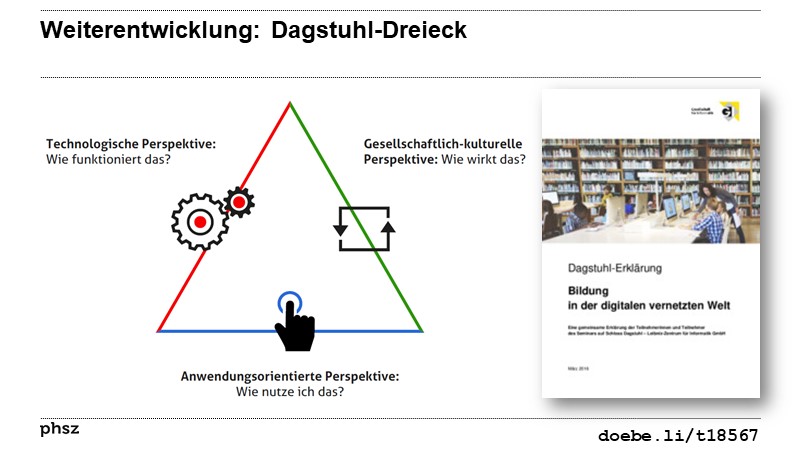
- Education in a digitized world
Perspectives from the German speaking part of Switzerland
Committee on Culture, Science, Education and Media of the Council of Europe, 21.06.2019

- 1001 Fragen zu Digitalisierung und Fachdidaktik
Hauptvortrag von Ralf Romeike und Beat Döbeli Honegger an der Jahrestagung der Gesellschaft für Fachdidaktik (GFD)
Regensburg, bzw. Internet, 23.09.2020
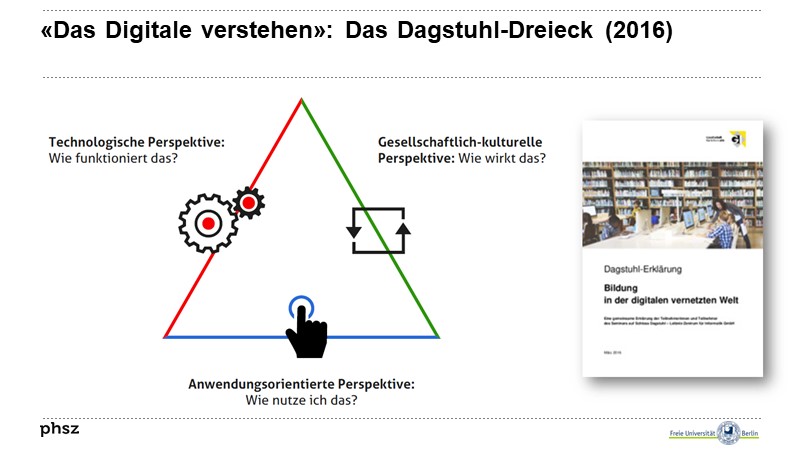
- Informatik als Teil der Digitalen Bildung in der Grundschule...
.... ein Blick von außen
Telekom-Stiftung (virtuell), 18.11.2020

- Informatische Bildung / Schulische Bildung - Was wird diskutiert?
FabLab meets Bildung - Eine digitale Ringveranstaltung
Universität Bremen, 16.03.2021

- Computer Science in Swiss Schools
More 26 than 0 and 1?
University of St. Gallen, 27.10.2021
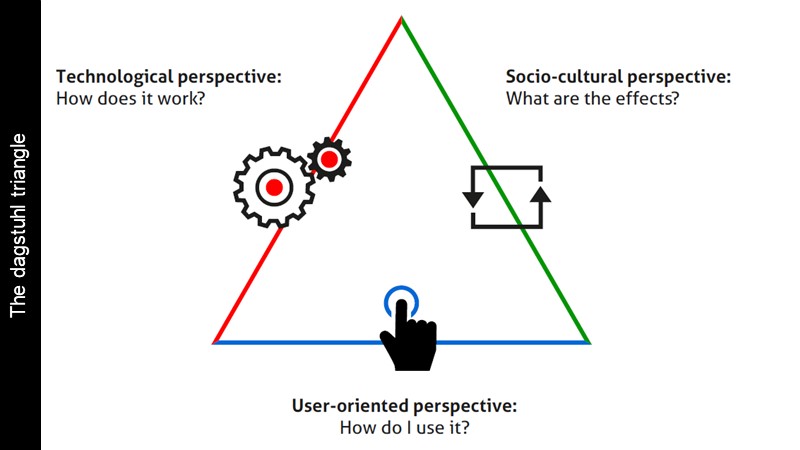
- Anforderungen an die Lehrkräftebildung MIT - ÜBER - IN digitalen Medien
QLB-BMBF-Kongress Berlin, 22.11.2021
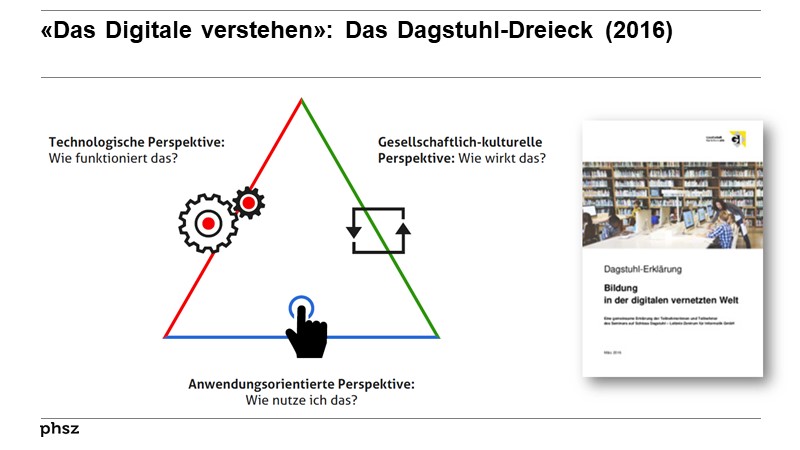
- Die Reise nach Digitalien
PH VS / HEP VS, Sion, 18.01.2023
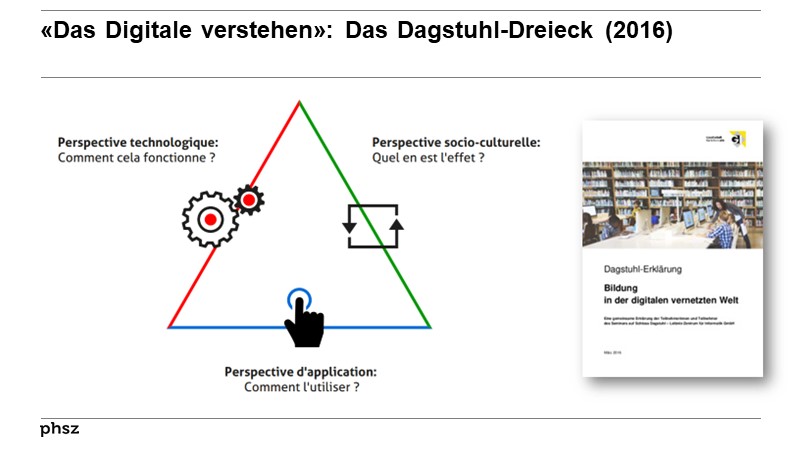
- Lehrkräftebildung in einer digitalisierten Welt
Fachgespräche Lehrerinnen- und Lehrerbildung, Universität Münster, 01.02.2023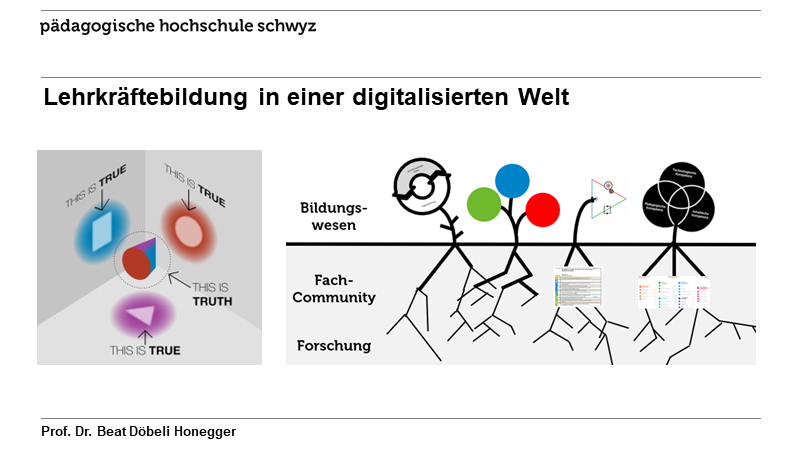
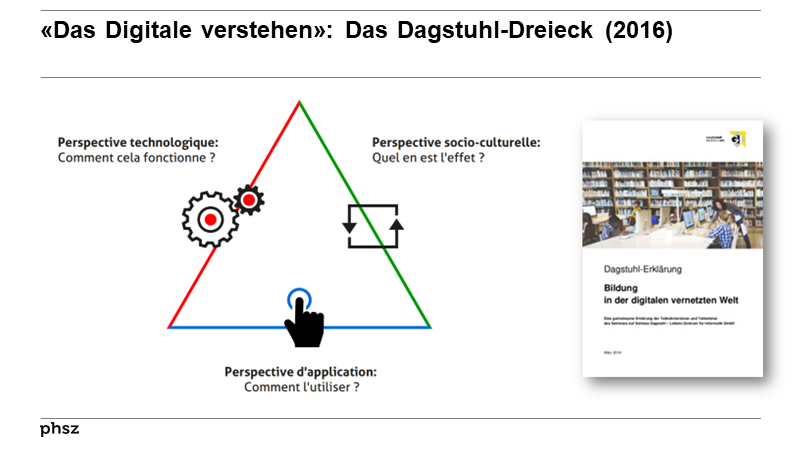
- ChatGPT - der iPhone-Moment für KI?
Klausur PHSZ, Oberägeri, 14.02.2023
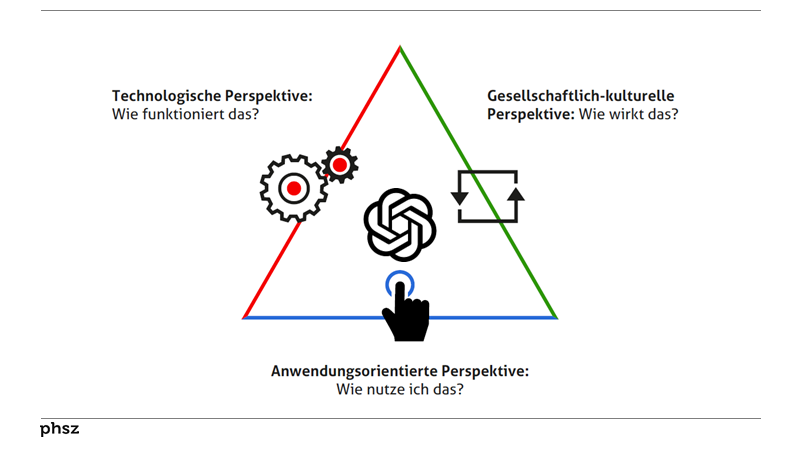
- ChatGPT und die (informatische (Schul-))Bildung
Ausschuss "Bildung, Fachkräfte und Diversität" von digitalswitzerland, 07.03.2023
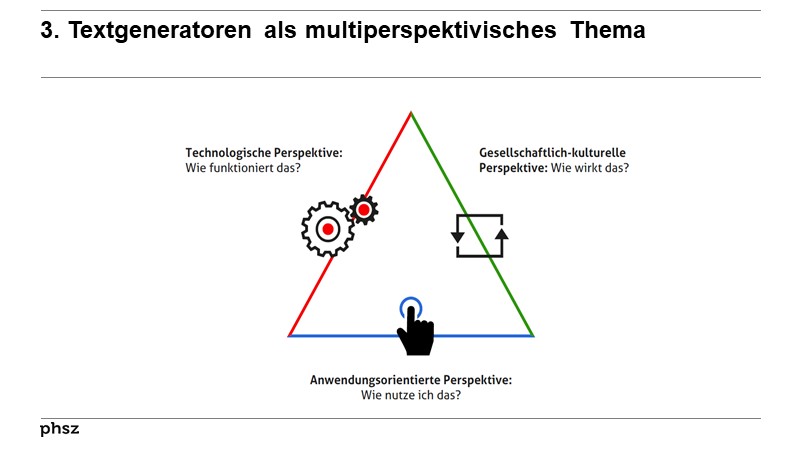
- ChatGPT & Co.: Klares und Unklares
Institutskonferenz F&E PH FHNW, 20.03.2023
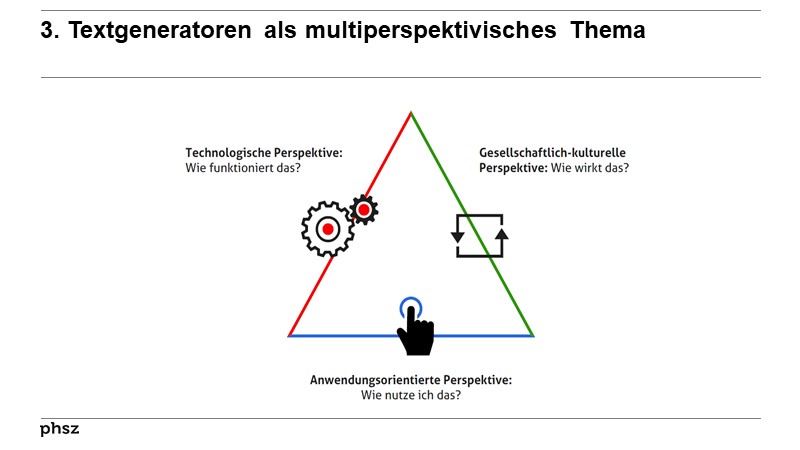
- Schule, Digitalisierung und die Rolle der Informatik
Landesinformatiktag Hamburg und Schleswig-Holstein, 25.03.2023
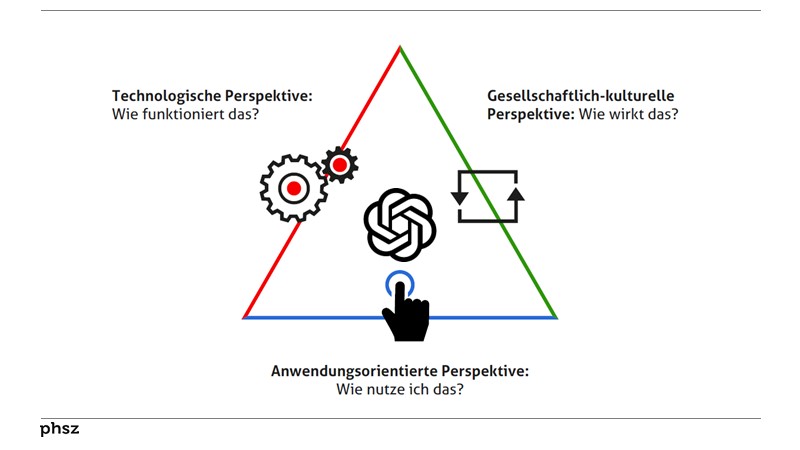
- ChatGPT - der iPhone-Moment des maschinellen Lernens
AG Fremdsprachen Kammer PH swissuniversities, 25.05.2023
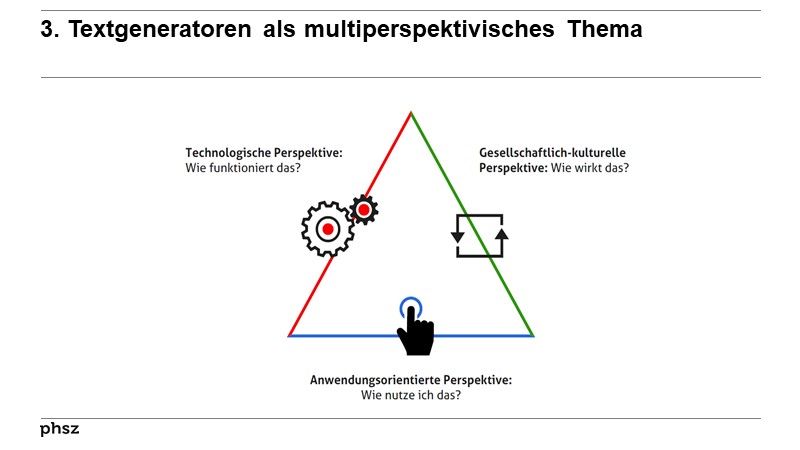
- ChatGPT - der iPhone-Moment des maschinellen Lernens
NMS Bern, 07.06.2023
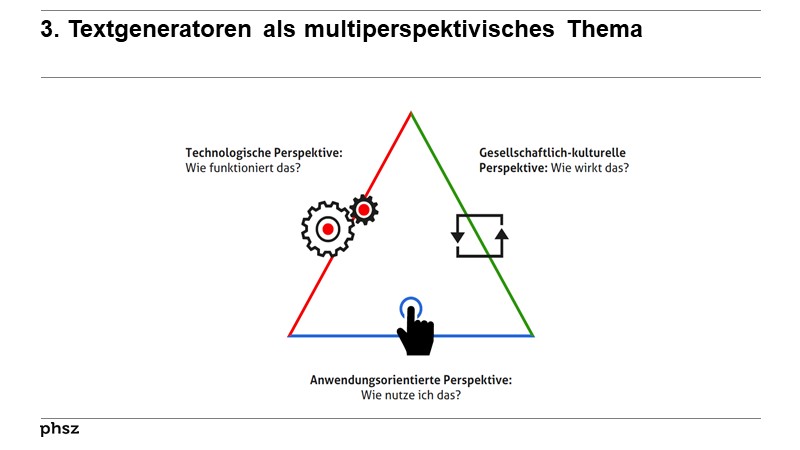
- KVreform GPT
Kaufmännische Berufsschule Schwyz, 05.07.2023
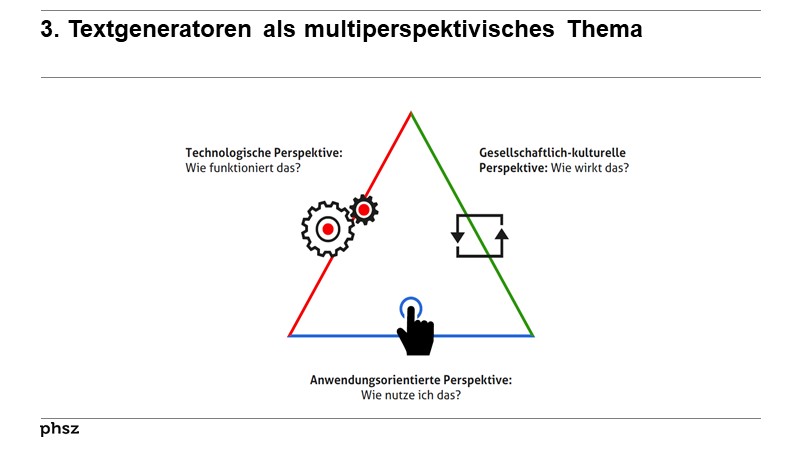
- BBZGPT
Berufsbildungszentrum Goldau, 17.08.2023
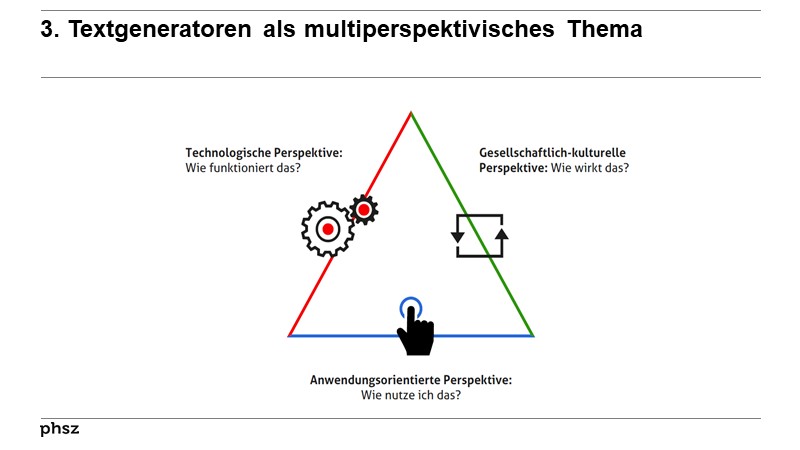
- Nachrichtenkompetenz – und jetzt auch noch ChatGPT & Co.
Tagung "Nachrichtenkompetenz auf Sekundarstufe II" von ZHAW und SRG public value, 03.11.2023
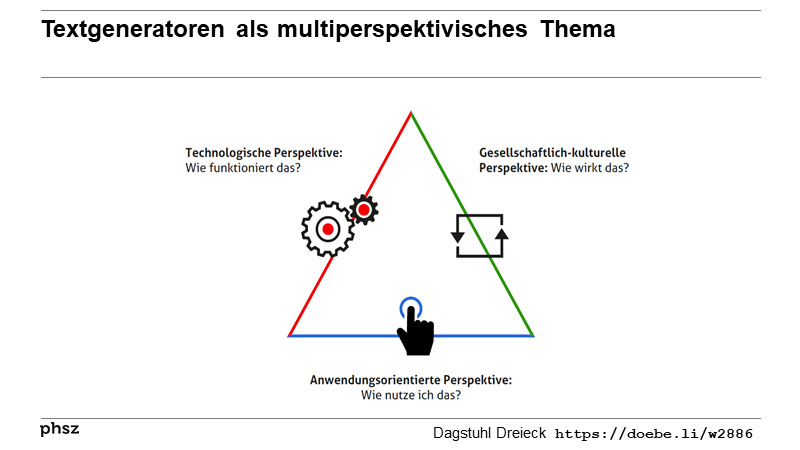
- ChatGPT & Co. – eine Etappe auf der Reise nach Digitalien
CAS Lernreise, 19.01.2024
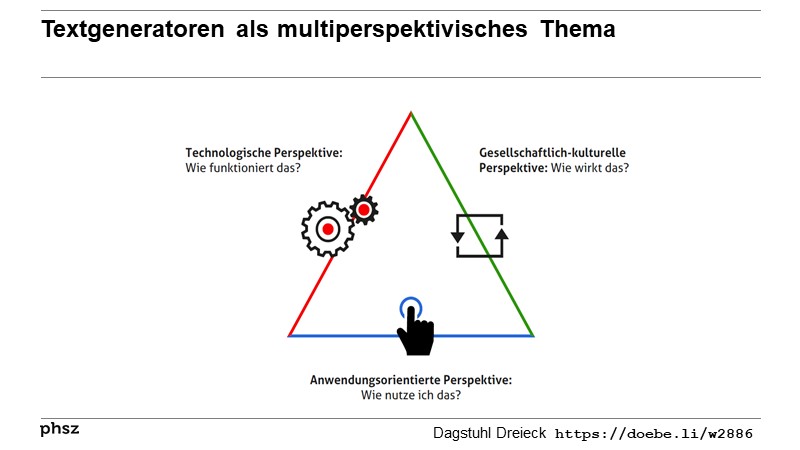
- Wenn ChatGPT in der Lehrer:innenbildung mitredet
(Video des Referats)
Tag der Lehre der PHZH, 01.02.2024
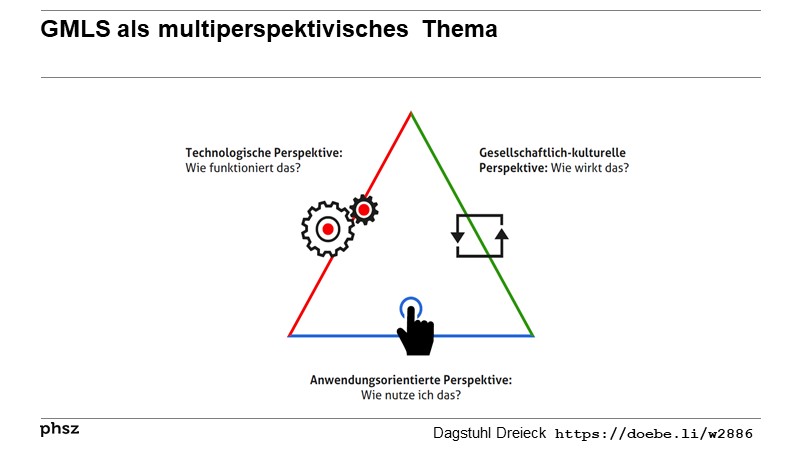
- Antworten auf Knopfdruck?
Mitarbeitendenklausur der PHSZ, 19.02.2024
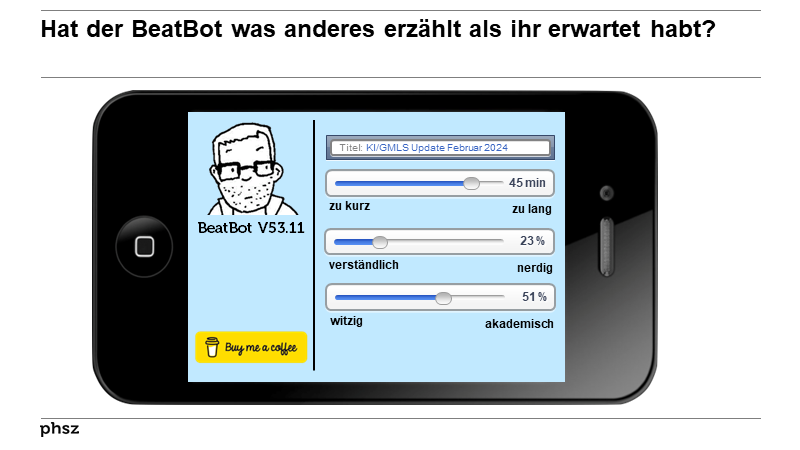
- Was will uns ChatGPT sagen?
8. Pädagogischer Dialog Liechtenstein, Vaduz, 21.02.2024
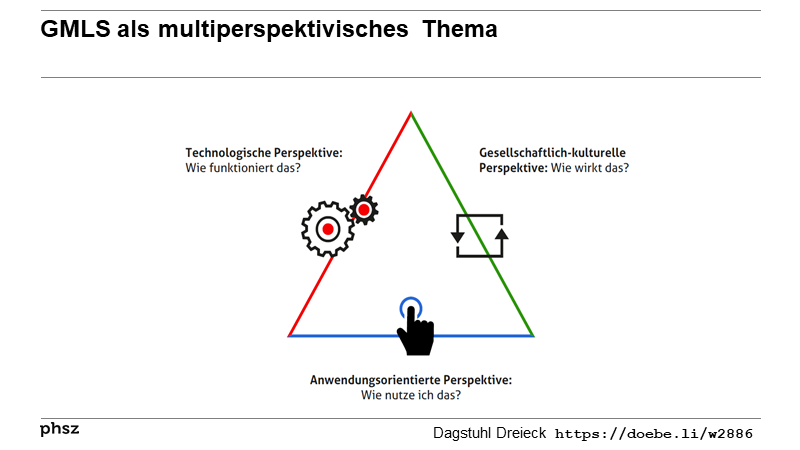
- Sprachmaschinen.
Deutschsprachige AG Fremdsprachen der EDK, PHZH, 20.03.2024

- Überfluten uns ChatGPT & Co.?
Tagung des Berufsverbands Schulleitungen Bern
Schwellenmätteli Bern, 24.05.2024
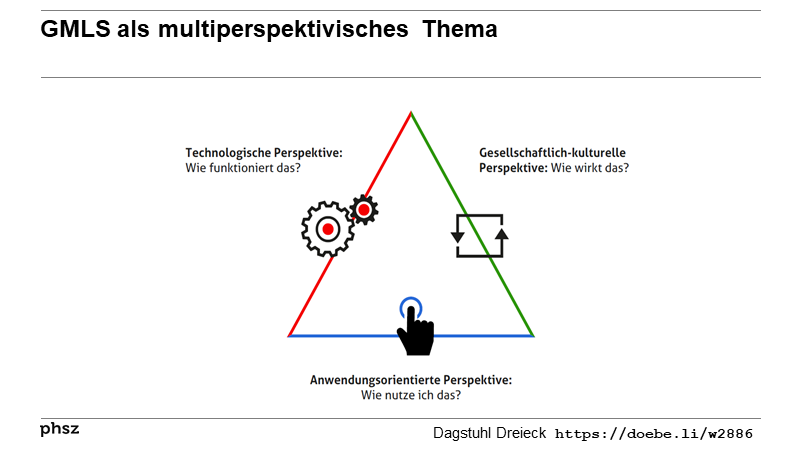
- GMLS - Wie sag ich‘s meinen Lehrer:innen (und der SL)?
Netzwerktreffen PICTS und ICT-Leiter:innen Kanton Schwyz, Uri & Glarus
PHSZ, 05.06.2024
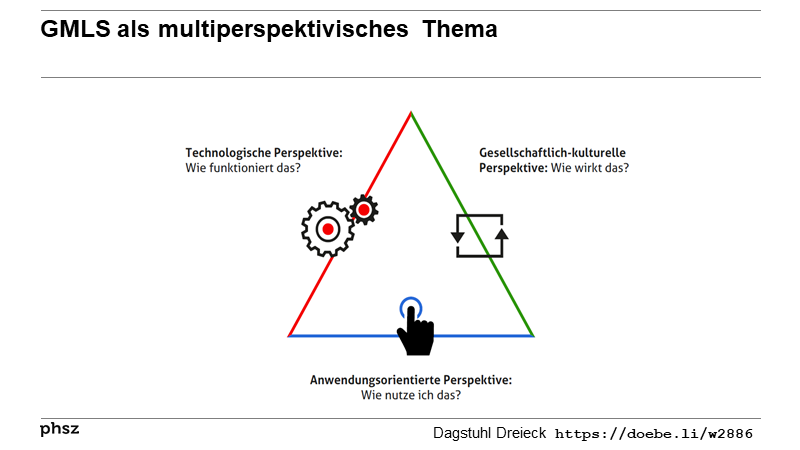
- Generative Machine-Learning-Systeme in der Bildung
VR- und GL-Retraite der Orell Füssli Gruppe
Hasliberg, 12.06.2024

- Wenn das Digitale in der Bildung mitzureden beginnt
Bildungstag Kanton Glarus, 04.09.2024
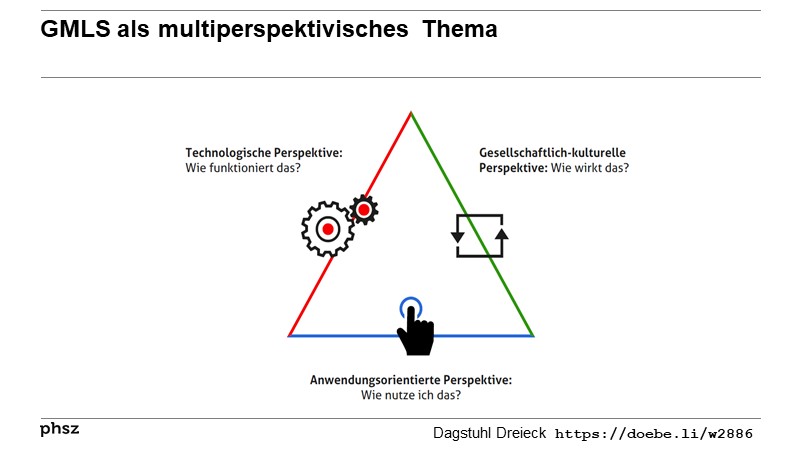
- Starttag Spezialist:in ICT-Essentials
PHSZ, 11.09.2024
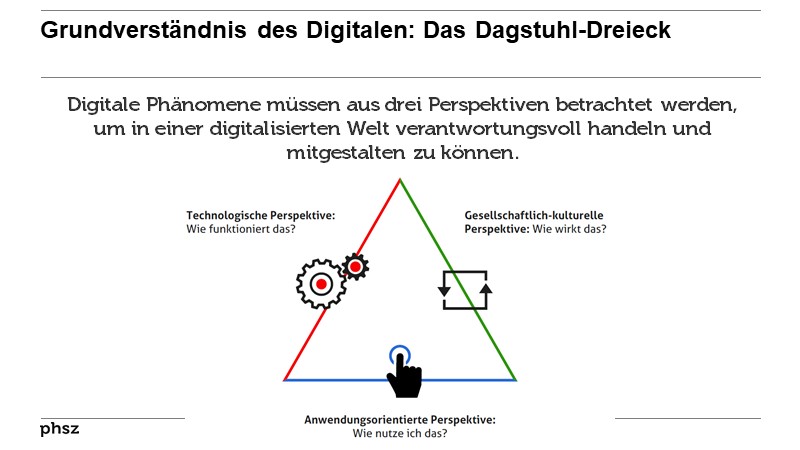
 Zitationsgraph (Beta-Test mit vis.js)
Zitationsgraph (Beta-Test mit vis.js)
 349 Erwähnungen
349 Erwähnungen 
- Vernetztes Lernen mit digitalen Medien - Proceedings der ersten Tagung "Computergestütztes Kooperatives Lernen (D-CSCL 2000)" am 23. und 24. März 2000 in Darmstadt (2000)


- 9. Individuell, Arbeitsteilig und Kooperativ - Ein integrierter Ansatz zur Erstellung, Pflege und Nutzung multimedialer Lehrmaterialien (Andreas Brennecke, Harald Selke)


- 9. Individuell, Arbeitsteilig und Kooperativ - Ein integrierter Ansatz zur Erstellung, Pflege und Nutzung multimedialer Lehrmaterialien (Andreas Brennecke, Harald Selke)
- Informationstechnische Bildung und Medienerziehung - MedienPädgogik Heft 4 (Annemarie Hauf-Tulodziecki) (2001)
- Informatikunterricht und Medienbildung - INFOS 2001 9. GI-Fachtagung Informatik und Schule vom 17.-20. September 2001 in Paderborn (Reinhard Keil, Johannes Magenheim) (2001)

- Informatik im Herstellungs- und Nutzungskontext - Ein technikbezogener Zugang zur fachübergreifenden Lehre (Dieter Engbring) (2003)


- Lehr- Lernprozesse im Informatik-Anfangsunterricht - Theoriegeleitete Entwicklung und Evaluation eines Unterrichtskonzepts zur Objektorientierung in der Sekundarstufe II (Carsten Schulte) (2003)


- Didaktik der Informatik (Sigrid E. Schubert, Andreas Schwill) (2004)

- Didaktisches System für objektorientiertes Modellieren im Informatikunterricht der Sekundarstufe II (Torsten Brinda) (2004)


- Workshop ICT - SATW-tic-EDU 9/04 - Münchenwiler September 2004 (Arbeitsgruppe e-Education der SATW) (2004)


- Designing a curriculum (Johannes Magenheim, Olaf Scheel, Carsten Schulte)


- Designing a curriculum (Johannes Magenheim, Olaf Scheel, Carsten Schulte)
- Didaktik der Informatik - mit praxiserprobtem Unterrichtsmaterial (Ludger Humbert) (2005)


- ICER 2005 - International Computing Education Research Workshop 2005, ICER '05, Seattle, WA, USA, October 1-2, 2005 (Richard J. Anderson, Sally Fincher, Mark Guzdial) (2005)
- Novices' expectations and prior knowledge of software development - results of a study with high school students (Carsten Schulte, Johannes Magenheim) (2005)


- Novices' expectations and prior knowledge of software development - results of a study with high school students (Carsten Schulte, Johannes Magenheim) (2005)
- LOG IN 148/2007 (2007)

- Modellierung von Zuständen, Objekten und Suchbäumen - Mit Unterrichtsbeispielen in JAVA (Rüdeger Baumann) (2007)

- Die PYTHON VISUAL SANDBOX (Michael Weigend) (2007)

- Von der Komplexität eines Zentralabiturs - Thüringer Erfahrungen im Grund- und Leistungsfach Informatik (Michael Fothe, Wolfgang Moldenhauer, Otto Thiele) (2007)

- Modellierung von Zuständen, Objekten und Suchbäumen - Mit Unterrichtsbeispielen in JAVA (Rüdeger Baumann) (2007)
- INFOS 2007 - Didaktik der Informatik in Theorie und Praxis - 12. GI-Fachtagung Informatik und Schule (Sigrid E. Schubert) (2007)
- Strictly models and objects first - ein Unterrichtskonzept fuer OOM (Ira Diethelm)


- Strictly models and objects first - ein Unterrichtskonzept fuer OOM (Ira Diethelm)
- ICER 2007 - International Computing Education Research Workshop, ICER '07, Atlanta, GA, USA, September 15-16, 2007 (Richard J. Anderson, Sally Fincher, Mark Guzdial) (2007)
- Informatik erLeben - Beispiele für schülerinnen- und schüleraktivierenden Informatikunterricht (Ernestine Bischof, Roland Mittermeir) (2008)


- Interesse wecken und Grundkenntnisse vermitteln - 3. Münsteraner Workshop zur Schulinformatik - 7. Mai 2008 (Marco Thomas, Michael Weigend) (2008)


- Mobil Programmieren - Neugestaltung der Lernumgebung des Informatikunterrichts für die Schülerinnen (Matthias Heming, Ludger Humbert)


- Informatik und Gender - nehmt die Forschungsergebnisse ernst! (Ludger Humbert) (2008)


- Die duale Natur digitaler Artefakte als Kern Informatischer Bildung (Carsten Schulte)


- Informatik goes mobile - Einsatz Mobiler Endgeräte als Lernwerkzeug im Informatik-Unterricht (Hendrik Büdding)

- Mobil Programmieren - Neugestaltung der Lernumgebung des Informatikunterrichts für die Schülerinnen (Matthias Heming, Ludger Humbert)
- Handbuch Medienpädagogik (Uwe Sander, Friederike von Gross, Kai-Uwe Hugger) (2008)
- 99. Medienkompetenzförderung (Dorothee M. Meister, Bianca Burgfeld-Meise) (2021)


- 99. Medienkompetenzförderung (Dorothee M. Meister, Bianca Burgfeld-Meise) (2021)
- ICER 2008 - International Computing Education Research Workshop, ICER '08, Sydney, Australia, September 6-7, 2008 (Michael E. Caspersen, Raymond Lister, Mike Clancy) (2008)
- Attitudes about computing in postsecondary graduates (Michael Hewner, Mark Guzdial) (2008)


- Attitudes about computing in postsecondary graduates (Michael Hewner, Mark Guzdial) (2008)
- LOG IN 159/2009 (2009)

- Virtuelle Spaziergänge - Ein interaktiver virtueller Rundgang als Informatik-Projekt (Christian Steinbrucker) (2009)

- Präsentieren - eine Kompetenz fürs Leben (Rüdeger Baumann, Bernhard Koerber) (2009)

- Objektorientierte Modellbildung mit dem Java-Editor (Gerhard Röhner) (2009)

- Parkette, Symmetrien und islamische Kunst - Beiträge zum Kompetenzerwerb im Strukturieren, Vernetzen und Präsentieren (Rüdeger Baumann) (2009)

- Virtuelle Spaziergänge - Ein interaktiver virtueller Rundgang als Informatik-Projekt (Christian Steinbrucker) (2009)
- Fachdidaktische Diskussion von Informatiksystemen und der Kompetenzentwicklung im Informatikunterricht (Peer Stechert) (2009)


- Konzeption und Analyse neuer Maßnahmen in der Fort- und Weiterbildung von Informatiklehrkräften (Matthias Spohrer) (2009)


- INFOS 2009 - 13. GI-Fachtagung Informatik und Schule (21. - 24. September 2009 in Berlin) (Bernhard Koerber) (2009)


- Informatische Bildung im Primarbereich (Henry Herper, Volkmar Hinz)

- Informatische Bildung im Primarbereich (Henry Herper, Volkmar Hinz)
- ICER 2009 - Proceedings of the Fifth International Workshop on Computing Education Research, ICER 2009, Berkeley, CA, USA, August 10-11, 2009 (Michael J. Clancy, Michael E. Caspersen, Raymond Lister) (2009)
- Einsatzszenarien von Mobiltelefonen im Informatikunterricht (Matthias Heming) (2009)


- Didaktik der Informatik - Möglichkeiten empirischer Forschungsmethoden und Perspektiven der Fachdidaktik - 6. Workshop der GI-Fachgruppe DDI (Ira Diethelm, Christina Dörge, Claudia Hildebrandt, Carsten Schulte) (2010)


- Lehrerbildung Informatik - Was ist zu tun? (Ira Diethelm, Lutz Hellmig, Steffen Friedrich, Norbert Breier, Torsten Brinda) (2010)


- Wie funktioniert eigentlich das Internet? - Empirische Untersuchung von Schülervorstellungen (Ira Diethelm, Stefan Zumbrägel) (2010)


- Lehrerbildung Informatik - Was ist zu tun? (Ira Diethelm, Lutz Hellmig, Steffen Friedrich, Norbert Breier, Torsten Brinda) (2010)
- 25 Jahre Schulinformatik - Zukunft mit Herkunft (Gerhard Brandhofer, Gerald Futschek, Peter Micheuz, Anton Reiter, Karl Schoder) (2010)


- Koli Calling 2010 - 10th Koli Calling International Conference on Computing Education Research, Koli Calling '10, Koli, Finland, October 28-31, 2010 (Carsten Schulte, Jarkko Suhonen) (2010)
- Schule in der digitalen Welt - Medienpädagogische Ansätze und Schulforschungsperspektiven (Carsten Albers, Johannes Magenheim, Dorothee M. Meister) (2011)

- Medien nutzen, Medien gestalten - eine qualitative Analyse der Computernutzung (Carsten Schulte, Maria Knobelsdorf)


- Medien nutzen, Medien gestalten - eine qualitative Analyse der Computernutzung (Carsten Schulte, Maria Knobelsdorf)
- Informatikunterricht - Wünsche und Erwartungen von Schülerinnen und Schülern (Hannelore Barthel) (2011)


- Medien & Bildung - Institutionelle Kontexte und kultureller Wandel (Torsten Meyer, Christina Schwalbe, Wey-Han Tan, Ralf Appelt) (2011)

- Informatik in Bildung und Beruf - INFOS 2011 - 14. GI-Fachtagung Informatik und Schule (Marco Thomas) (2011)


- Agiler Informatikunterricht - Soziale Aspekte der professionellen Softwareentwicklung einfach und erfolgreich im Unterricht erfahrbar machen (Timo Göttel) (2011)


- Agiler Informatikunterricht - Soziale Aspekte der professionellen Softwareentwicklung einfach und erfolgreich im Unterricht erfahrbar machen (Timo Göttel) (2011)
- Computing at School - International comparisons (Simon Peyton Jones) (2011)


- LOG IN 169/170/2011 - Wie viel informatische Bildung braucht der Mensch? Informatische Bildung für alle! (2011)


- Informatische Bildung für alle! (Bernhard Koerber, Ingo-Rüdiger Peters)

- Informatik, informatische Bildung und Medienbildung (Ludger Humbert)

- Wie viel Programmierkompetenz braucht der Mensch? (Kerstin Strecker)

- Informatische Bildung in Deutschland - Eine Analyse der informatischen Bildung an allgemeinbildenden Schulen auf der Basis der im Jahr 2010 gültigen Lehrpläne und Richtlinien (Isabelle Starruß, Bettina Timmermann)

- Auf dem Weg zu Bildungsstandards Informatik für die Sekundarstufe II - Probleme und Lösungsvorschläge (Rüdeger Baumann)
- Informatische Bildung für alle! (Bernhard Koerber, Ingo-Rüdiger Peters)
- Shut down or restart? - The way forward for computing in UK schools (The Royal Society) (2012)


- 4. The School Curriculum
- Visual Program Simulation in Introductory Programming Education (Juha Sorva) (2012)


- Grundkompetenzen - Zeitschrift Computer und Unterricht 87 (2012)

- Systematische Zugänge zu Grundkompetenzen - Orientierung für Schulen (Rudolf Peschke)

- Wege zu Grundkompetenzen einer Medienbildung - Entwicklungen und Perspektiven (Rudolf Peschke)

- Systematische Zugänge zu Grundkompetenzen - Orientierung für Schulen (Rudolf Peschke)
- LOG IN 172/173 2012 (2012)

- Vom Überwinden der Entfernung - Eine kleine Geschichte der Telekommunikation (Bernhard Koerber, Ingo-Rüdiger Peters)


- Vom Überwinden der Entfernung - Eine kleine Geschichte der Telekommunikation (Bernhard Koerber, Ingo-Rüdiger Peters)
- Fach- und bildungswissenschaftliche Grundlagen für den Informatikunterricht in der Sekundarstufe I (Arno Pasternak) (2013)


- Digitale Schule Österreich (Peter Micheuz, Anton Reiter, Gerhard Brandhofer, Martin Ebner, Barbara Sabitzer) (2013)


- Evaluation des österreichischen Referenzmodells für digitale Kompetenzen (Stefan Welling, Ines Averbeck, Julia Renke)


- Evaluation des österreichischen Referenzmodells für digitale Kompetenzen (Stefan Welling, Ines Averbeck, Julia Renke)
- Informatik erweitert Horizonte - 15. GI-Fachtagung "Informatik und Schule" - INFOS 2013 - 26.- 28.09.2013 (2013)


- «Ich glaube, Google ist so was wie eine Vorhalle des Internets» - Erste Ergebnisse einer qualitativen Untersuchung von Schülervorstellungen von der Suchmaschine Google (Oliver Seifert, Tony Sauck, Maximilian Schwarzbach, Christopher Lerch, Martin Weinert, Maria Knobelsdorf)

- Ein moderner Ansatz für Anchored Instruction im Informatikunterricht (Jens Gallenbacher, Dominik Heun)

- Physical Computing im Informatikunterricht (Mareen Grillenberger, Ralf Romeike)

- Informatik ist mehr als Informatik! - Oder: Warum sich die Informatik mit dem Leitmedienwechsel befassen muss (Beat Döbeli Honegger) (2013)


- «Ich glaube, Google ist so was wie eine Vorhalle des Internets» - Erste Ergebnisse einer qualitativen Untersuchung von Schülervorstellungen von der Suchmaschine Google (Oliver Seifert, Tony Sauck, Maximilian Schwarzbach, Christopher Lerch, Martin Weinert, Maria Knobelsdorf)
- INFOS 2013 Praxisband (Norbert Breier, Peer Stechert, Thomas Wilke) (2013)


- Einsatz von Speicherprogrammierbaren Steuerungen im Lernlabor Abenteuer Technik (Jens Gallenbacher, Dominik Heun, Kristin Rammelt)

- Einsatz von Speicherprogrammierbaren Steuerungen im Lernlabor Abenteuer Technik (Jens Gallenbacher, Dominik Heun, Kristin Rammelt)
- ICER 2013 - International Computing Education Research Conference, ICER '13, La Jolla, CA, USA, August 12-14, 2013 (Beth Simon, Alison Clear, Quintin I. Cutts) (2013)
- Identity development of CS and IT students - what's the role of higher education? (Anne-Kathrin Peters) (2013)


- Identity development of CS and IT students - what's the role of higher education? (Anne-Kathrin Peters) (2013)
- Koli Calling 2013 - 13th Koli Calling International Conference on Computing Education Research, Koli Calling '13, Koli, Finland, November 14-17, 2013 (Mikko-Jussi Laakso, Simon) (2013)
- Getting to know computer science freshmen (Päivi Kinnunen, Maija Marttila-Kontio, Erkki Pesonen) (2013)


- The use of code reading in teaching programming (Teresa Busjahn, Carsten Schulte) (2013)


- Why is big-O analysis hard? (Miranda C. Parker, Colleen M. Lewis) (2013)


- Getting to know computer science freshmen (Päivi Kinnunen, Maija Marttila-Kontio, Erkki Pesonen) (2013)
- WiPSCE 2014 - Proceedings of the 9th Workshop in Primary and Secondary Computing Education, Berlin, Germany, November 5-7, 2014 (Carsten Schulte, Michael E. Caspersen, Judith Gal-Ezer) (2014)
- Identifying and formulating teachers’ beliefs and motivational orientations for computer science teacher education (Elena Bender, Niclas Schaper, Michael E. Caspersen, Melanie Margaritis, Peter Hubwieser) (2015)


- Subjektive Theorien von Informatiklehrkraften zur fachdidaktischen Strukturierung ihres Unterrichts (Ana-Maria Stoffers) (2015)


- IT an allgemeinbildenden Schulen - Auswertung internationaler empirischer Studien und Literaturanalyse (Carola Schauer, Hanno Schauer) (2015)


- Die digitale Gesellschaft - Login Nr 180 (2015)

- Aspekte einer digitalen Gesellschaft - Eine Gesellschaft digitaler Ureinwohner, digitaler Einwanderer und digitaler Ignoranten (Bernhard Koerber) (2015)

- Digitale Medien in der Schule - in medio virtus (Christian Spannagel) (2015)

- Aspekte einer digitalen Gesellschaft - Eine Gesellschaft digitaler Ureinwohner, digitaler Einwanderer und digitaler Ignoranten (Bernhard Koerber) (2015)
- Strategisches Studienmarketing zur Begünstigung der Aufnahme eines Informatik-Studiums (Christian Götz) (2015)
- Informatische Schlüsselkompetenzen (Christina Dörge) (2015)


- Digitale Medien und Interdisziplinarität - Tagungsband der GMW-Jahrestagung 2015 (Nicolae Nistor, Sabine Schirlitz) (2015)


- Braucht die Medienpädagogik Impulse aus der Informatik? - Erkenntnisse aus interdisziplinären Seminaren (Tilman-Mathies Klar, Dieter Engbring) (2015)


- Braucht die Medienpädagogik Impulse aus der Informatik? - Erkenntnisse aus interdisziplinären Seminaren (Tilman-Mathies Klar, Dieter Engbring) (2015)
- Neo-Piagetian Theory and the Novice Programmer (Donna Teague) (2015)


- Konzeption eines Informatik-Schülerlabors und Erforschung dessen Effekte auf das Bild der Informatik bei Kindern und Jugendlichen (Nadine Bergner) (2015)


- Informatik allgemeinbildend begreifen - INFOS 2015 (Jens Gallenbacher) (2015)


- Informatik Enlightened - Informatik (neu) beleuchtet dank Physical Computing mit Arduino (Nadine Bergner, Ulrik Schroeder)

- Informatik Enlightened - Informatik (neu) beleuchtet dank Physical Computing mit Arduino (Nadine Bergner, Ulrik Schroeder)
- ICER 2015 - Proceedings of the eleventh annual International Conference on International Computing Education Research, ICER 2015, Omaha, NE, USA, August 09 - 13, (Brian Dorn, Judy Sheard, Quintin I. Cutts) (2015)
- Fourth Grade Students Reading Block-Based Programs - Predictions, Visual Cues, and Affordances (Hilary A. Dwyer, Charlotte Hill, Alexandria K. Hansen, Ashley Iveland, Diana Franklin, Danielle Harlow) (2015)


- Fourth Grade Students Reading Block-Based Programs - Predictions, Visual Cues, and Affordances (Hilary A. Dwyer, Charlotte Hill, Alexandria K. Hansen, Ashley Iveland, Diana Franklin, Danielle Harlow) (2015)
- Visuelles Programmieren - LOG IN 181/182 (2015)

- Haben Sie noch ELAN? (Bernhard Koerber)

- Visuelles Programmieren - Eine Einführung in das objektorientierte Programmieren mit SQUEAK/SMALLTALK (Teil 1) (Rüdeger Baumann)

- Haben Sie noch ELAN? (Bernhard Koerber)
- Koli Calling 2015 - Proceedings of the 15th Koli Calling Conference on Computing Education Research, Koli, Finland, November 19-22, 2015 (Päivi Kinnunen, Judy Sheard) (2015)
- Second year computer science and IT students' experience of participation in the discipline (Anne-Kathrin Peters, Anders Berglund, Anna Eckerdal, Arnold Pears) (2015)


- Investigating computing students' identity development (Anne-Kathrin Peters) (2015)


- Second year computer science and IT students' experience of participation in the discipline (Anne-Kathrin Peters, Anders Berglund, Anna Eckerdal, Arnold Pears) (2015)
- Der Berufswahlprozess von Informatiklehrkräften (Dorothee Müller) (2016)


- Bildungsstandards Informatik für die Sekundarstufe II - Empfehlungen der Gesellschaft für Informatik e. V. erarbeitet vom Arbeitskreis »Bildungsstandards SII« (Gerhard Röhner, Torsten Brinda, Volker Denke, Lutz Hellmig, Theo Heußer, Arno Pasternak, Andreas Schwill, Monika Seiffert) (2016)


- Medienintegration und Governance im schulischen Bildungssystem - Stellungnahme zur Anhörung des Ausschusses für Schule
und Weiterbildung des Landtags Nordrhein-‐Westfalen am 3.5.2016 (Andreas Breiter) (2016)


- Didaktik der Informatik (Eckart Modrow, Kerstin Strecker) (2016)


- 1. Einleitung


- 1. Einleitung
- Lernen im digitalen Wandel - Stellungnahme zum Antrag 'Informatische Allgemeinbildung gewährleisten - Pflichtfach Informatik an allen Schulformen einführen" (Richard Heinen, Michael Kerres) (2016)


- Digitale Medien in der Bildung - Endbericht zum TA-Projekt (Steffen Albrecht, Christoph Revermann) (2016)


- Digitale Datenerhebung und -verwertung als Herausforderung für Medienbildung und Gesellschaft - Ein medienpädagogisches Diskussionspapier zu Big Data und Data Analytics (Sandra Aßmann, Niels Brüggen, Valentin Dander, Harald Gapski, Gerda Sieben, Angela Tillmann, Isabel Zorn) (2016)


- Ada Lovelace - LOG IN 183/184 (2016)

- Die Geschlechterkluft im Informatikunterricht - Teil 1 (Marco Thomas)

- Programmiereinstieg für Schülerinnen - - und auch für Schüler (Petra Nußdorfer)

- Die Geschlechterkluft im Informatikunterricht - Teil 1 (Marco Thomas)
- Entwicklung und Validierung eines Instruments zur Messung des Wissens über Fehlvorstellungen in der Informatik (Laura Ohrndorf) (2016)


- Medienbildung und informatische Bildung - quo vadis? (Klaus Rummler, Beat Döbeli Honegger, Heinz Moser, Horst Niesyto) (2016)


- Editorial: Medienbildung und informatische Bildung - quo vadis?


- Konkurrenz oder Kooperation? - Zur Entwicklung des Verhältnisses von Medienbildung und informatischer Bildung (Gerhard Tulodziecki)


- Zur Relevanz informatischer Bildung in der Schule für den Erwerb computer- und informationsbezogener Kompetenzen als Teilaspekt von Medienbildung. Ergebnisse für Deutschland und die Schweiz im internationalen Vergleich (Birgit Eickelmann, Kerstin Drossel) (2016)


- Editorial: Medienbildung und informatische Bildung - quo vadis?
- L. A. multimedia 1-2017 (2017)

- Wie funktioniert ein Computer? (Johannes Zylka)

- Wie funktioniert ein Computer? (Johannes Zylka)
- Pädagogischer Mehrwert? - Digitale Medien in Schule und Unterricht (Christian Fischer) (2017)

- Digitalisierung als Herausforderung für die Medienpädagogik - Bildung in einer digital geprägten Welt (Michael Kerres)

- Pädagogischer Mehrwert? - Digitale Medien in Schule und Unterricht - eine Einführung (William Middendorf)

- Digitalisierung als Herausforderung für die Medienpädagogik - Bildung in einer digital geprägten Welt (Michael Kerres)
- Die deutsche Schule 2/2017 - Bildung in der digitalen Welt (Isabell van Ackeren, Götz Bieber) (2017)


- Digitale Souveränität leben! - Herausforderungen an das deutsche Bildungssystem (Christoph Meinel, Maxim Asjoma, Achim Berg, Juliane Petrich, Nils Faltin, Michael Jäckel, Patrick Meinhardt, Daniel Krupka, Bernd Welz, Mirko Wesling) (2017)


- Software takes command - Herausforderungen der «Datafizierung» für die Medienpädagogik in Theorie und Praxis (Sabine Eder, Claudia Mikat, Angela Tillmann) (2017)
- Software takes command - Herausforderungen der «Datafizierung» für die Medienpädagogik in Theorie und Praxis


- Wie informatische Bildung hilft, die digitale Gesellschaft zu verstehen und mitzugestalten (Ralf Romeike) (2017)


- Software takes command - Herausforderungen der «Datafizierung» für die Medienpädagogik in Theorie und Praxis
- Medienbildung und informatische Bildung in der Volksschule des Kantons Luzern - Eine Analyse von Gelingensbedingungen zur Implementierung auf der Basis von Schulentwicklungs- und -steuerungsprozessen (Martina Ammer) (2017)


- Zehn Jahre Elementarinformatik – Elementare Informatikkompetenzen als Basis für nicht-konsumierenden und reflektierten Umgang mit Computer-Medien in der Vor- und Grundschule, 2008-2017 - Werkstattberichte zur Elementarinformatik, Band 1 (Ute Schmid, Anja Gärtig-Daugs) (2017)


- Social Demands in Ubiquitous Computing - Contexts for Tomorrow’s Learning (Mareen Grillenberger, Ralf Romeike) (2017)


- Tomorrow's Learning: Involving Everyone. Learning with and about Technologies and Computing - 11th IFIP TC 3 World Conference on Computers in Education, WCCE 2017, Dublin, Ireland, July 3-6, 2017 (Arthur Tatnall, Mary Webb) (2017)


- 49. Measuring Learners’ Interest in Computing (Education) - Development of an Instrument and First Results (Torsten Brinda, David Tobinski, Stefan Schwinem)


- 52. Educational Support on Computing and Informatics as Means of Empowering Disadvantaged Young People in Developed Countries - Development of an Instrument and First Results (Toshinori Saito)


- 66. Education in the Digital Networked World - Towards Defining Measures for Improved Quality of Teaching and Learning in the First Year of Computer Science Studies (Torsten Brinda, Ira Diethelm)


- 49. Measuring Learners’ Interest in Computing (Education) - Development of an Instrument and First Results (Torsten Brinda, David Tobinski, Stefan Schwinem)
- Wegleitung «Medien und Informatik» für Lehrpersonen der Primarstufe (5./6. Klasse) (Iwan Schrackmann, Morena Borelli, Urs Frischherz, Michael Hielscher) (2017)


- Die Rolle der Kernprinzipien von Cultural Software in der Gestaltung von Schulentwicklungsprojekten (Ekaterina Anokhina) (2017)


- Mit Daten jonglieren - Datenstrukturen Z2 (Bettina Waldvogel) (2017)


- Nutze die Macht der Algorithmen - Algorithmen Z2 (Urs Meier, Michel Hauswirth) (2017)


- Coding - Computer + Unterricht Nr. 107/2017 (Stefan Aufenanger) (2017)

- 21st Century Skills


- Einen Rechner braucht es nicht (Christian Kleinhanß)

- Informatik wird zum Thema - Aktuelle Entwicklungen in der Bildungspolitik (Rudolf Peschke, Gerhard Röhner)

- 21st Century Skills
- Informatische Bildung zum Verstehen und Gestalten der digitalen Welt - 17. GI-Fachtagung Informatik und Schule (Ira Diethelm) (2017)

- Verstehen - Vernetzen - Verantworten - Warum Medienbildung und informatische Bildung uns alle angehen und wir sie gemeinsam weiterentwickeln sollten (Thomas Knaus)

- Bild der Informatik von Grundschullehrpersonen - Erste Ergebnisse aus qualitativen Einzelfallstudien (Alexander Best)

- Hamburg 2050, Land unter? (Jonathan Otto, Michel Welke, Andreas Gramm, Leonard Diekmann, Maria Knobelsdorf)


- Ein Modell zur Analyse von Vorstellungen über Roboter und ihrer Funktionsweise (Kathrin Müller, Carsten Schulte)


- Vom Flaggenalphabet zur Vorratsdatenspeicherung - Schülerinnen und Schüler als Multiplikatoren technischer Aspekte der digitalen Welt (Klaus-Tycho Förster)


- Verstehen - Vernetzen - Verantworten - Warum Medienbildung und informatische Bildung uns alle angehen und wir sie gemeinsam weiterentwickeln sollten (Thomas Knaus)
- Bildung Schweiz 11/2017 (2017)


- Digitalität und Selbst (Heidrun Allert, Michael Asmussen, Christoph Richter) (2017)

- Die medialen Subjekte des 21. Jahrhunderts - Digitale Kompetenzen und/oderCritical Digital Citizenship (Felicitas Macgilchrist)


- Die medialen Subjekte des 21. Jahrhunderts - Digitale Kompetenzen und/oderCritical Digital Citizenship (Felicitas Macgilchrist)
- Proceedings of the 12th Workshop on Primary and Secondary Computing Education, WiPSCE 2017, Nijmegen, The Netherlands, November 8-10, 2017 (Erik Barendsen, Peter Hubwieser) (2017)
- Towards a grounded theory of how students identify computing (Michael T. Rücker, Niels Pinkwart) (2017)


- Towards a grounded theory of how students identify computing (Michael T. Rücker, Niels Pinkwart) (2017)
- Schule digital - der Länderindikator 2017 - Schulische Medienbildung in der Sekundarstufe I mit besonderem Fokus auf MINT-Fächer im Bundesländervergleich und Trends von 2015 bis 2017 (Ramona Lorenz, Wilfried Bos, Manuela Endberg, Birgit Eickelmann, Silke Grafe, Jan Vahrenhold) (2017)


- Überlegungen zu einem Beitrag zur Lehrerbildung in der digital vernetzten Welt - Ein auf Erfahrungen gestützter Bericht und Diskussionsbeitrag (Dieter Engbring) (2018)


- Unterrichtsmethoden für den Informatikunterricht (Andreas Zendler) (2018)


- 3. Beispiele für den Informatikunterricht (Andreas Zendler, The Instructional Method Group)


- 3. Beispiele für den Informatikunterricht (Andreas Zendler, The Instructional Method Group)
- Empowering learners with tools in CS education - Physical computing in secondary schools (Mareen Grillenberger, Ralf Romeike) (2018)


- Digitale Bildung - Medienbezogene Bildungskonzepte für die «nächste Gesellschaft» (Jasmin Bastian, Tobias Feldhoff, Marius Harring, Klaus Rummler) (2018)
- [Me]nsch - Werkzeug - [I]nteraktion - Theoretisch-konzeptionelle Analysen zur «Digitalen Bildung» und zur Bedeutung der Medienpädagogik in der nächsten Gesellschaft (Thomas Knaus)


- Notwendigkeit der Integration elementarinformatischer Lerneinheiten in den Vor- und Grundschulunterricht (Ute Schmid, Anja Gärtig-Daugs)


- [Me]nsch - Werkzeug - [I]nteraktion - Theoretisch-konzeptionelle Analysen zur «Digitalen Bildung» und zur Bedeutung der Medienpädagogik in der nächsten Gesellschaft (Thomas Knaus)
- Kompetenzen für informatische Bildung im Primarbereich (Entwurfsfassung) - Entwurfsfassung für Empfehlungen der Gesellschaft für Informatik e. V. (Arbeitskreis Bildungsstandards Primarbereich) (2018)


- Programming Paradigms and Beyond (Shriram Krishnamurthi, Kathi Fisler) (2018)


- Digitale Bildung versus Informatikunterricht? (2018)

- Bildung in der digitalen Welt - Anmerkungen zum Strategiepapier der KMK (Steffen Friedrich)


- Ist der Informationsbegriff für die Schulinformatik hilfreich? (Eckart Modrow)

- Benutzen – Analysieren – Gestalten – Verankern (Lutz Hellmig, Tino Hempel)

- Bildung in der digitalen Welt - Anmerkungen zum Strategiepapier der KMK (Steffen Friedrich)
- Überblicksstudie zum Thema Digitalisierung in der Lehrerbildung - Überblicksstudie zu elf ausgewählten Fallbeispielen (Lutz Goertz, Berit Baeßler, MMB Institut für Medien- und Kompetenzforschung) (2018)


- merz 4/2018 - Medienpädagogik und Informatik (2018)

- ICER 2018 - Proceedings of the 2018 ACM Conference on International Computing Education Research, ICER 2018, Espoo, Finland, August 13-15, 2018 (Lauri Malmi, Ari Korhonen, Robert McCartney, Andrew Petersen) (2018)
- Investigating the Relationship Between Spatial Skills and Computer Science (Jack Parkinson, Quintin I. Cutts) (2018)


- Investigating the Relationship Between Spatial Skills and Computer Science (Jack Parkinson, Quintin I. Cutts) (2018)
- Eine digitale Perspektive für den Sachunterricht? - Fachdidaktische Überlegungen und Implikationen (Philipp Straube, Martin Brämer, Hilde Köster, Ralf Romeike) (2018)


- Login 189/190 (2018)

- Informatische Kompetenzen in der Grundschule - Sichtweisen und Bausteine (Marco Thomas)

- Informatische Kompetenzen in der Grundschule - Sichtweisen und Bausteine (Marco Thomas)
- Calliope Mini - Eine Explorationsstudie im pädagogisch-didaktischen Kontext (Lydia Murmann, Heidi Schelhowe, Iris Bockermann, Simon Engelbertz, Saskia Illginnis, Antje Moebus) (2018)


- Proceedings of the 13th Workshop in Primary and Secondary Computing Education, WiPSCE 2018, Potsdam, Germany, October 04-06, 2018. (Andreas Mühling, Quintin I. Cutts) (2018)
- Developing a theoretically founded data literacy competency model (Andreas Grillenberger, Ralf Romeike) (2018)


- Developing a theoretically founded data literacy competency model (Andreas Grillenberger, Ralf Romeike) (2018)
- Informatics in Schools: Fundamentals of Computer Science and Software Engineering (Sergei Pozdniakov, Valentina Dagienė) (2018)


- Standards for Higher Secondary Education for Computer Science in Germany (Arno Pasternak, Lutz Hellmig, Gerhard Röhner)


- A Core Informatics Curriculum for Italian Compulsory Education (Luca Forlizzi, Michael Lodi, Anna Morpurgo, Violetta Lonati, Claudio Mirolo, Alberto Montresor, Mattia Monga, Enrico Nardelli)


- Investigating the Pedagogical Content Knowledge of Teachers Attending a MOOC on Scratch Programming (Ebrahim Rahimi, Ineke Henze, Felienne Hermans, Erik Barendsen)


- Evaluation of Learning Informatics in Primary Education (Johannes Magenheim, Kathrin Müller, Carsten Schulte, Nadine Bergner, Kathrin Haselmeier, Ludger Humbert, Dorothee Müller, Ulrik Schroeder)


- Standards for Higher Secondary Education for Computer Science in Germany (Arno Pasternak, Lutz Hellmig, Gerhard Röhner)
- Frühe informatische Bildung - Ziele und Gelingensbedingungen für den Elementar- und Primarbereich - Wissenschaftliche Untersuchungen zur Arbeit der Stiftung "Haus der kleinen Forscher" (Nadine Bergner, Hilde Köster, Johannes Magenheim, Kathrin Müller, Ralf Romeike, Ulrik Schroeder, Carsten Schulte) (2018)


- Medienbildung im Kontext der Digitalisierung (Gerhard Brandhofer, Christian Wiesner) (2018)


- Stellungnahme Öffentliches Fachgespräch zum Thema «Digitalisierung in Schule, Ausbildung und Hochschule» (Ira Diethelm) (2018)


- Prüfsteine für die Arbeit mit digitalen Unterrichtsmedien - Vortrag am Landesinstitut für Schule in Bremen beim BAK (Hilbert Meyer) (2018)


- Medienpädagogik und Didaktik der Informatik - Eine Momentaufnahme disziplinärer Bezüge und schulpraktischer Entwicklungen (2018)
- Kritische Entgegnung auf die Studie «Zur Relevanz informatischer Bildung in der Schule für den Erwerb computer- bzw. informationsbezogener Kompetenzen» (Torsten Brinda, Ira Diethelm, Lutz Hellmig, Johannes Magenheim, Ralf Romeike, Ulrik Schroeder) (2018)


- Digitale Bildung: ein interdisziplinäres Verständnis zwischen Medienpädagogik und Informatik (Andreas Dengel)


- A Design-Based Research Approach for introducing Algorithmics and Programming to Bavarian Primary Schools - Theoretical Foundation and Didactic Implementation (Katharina Geldreich, Alexandra Simon, Peter Hubwieser)


- Kritische Entgegnung auf die Studie «Zur Relevanz informatischer Bildung in der Schule für den Erwerb computer- bzw. informationsbezogener Kompetenzen» (Torsten Brinda, Ira Diethelm, Lutz Hellmig, Johannes Magenheim, Ralf Romeike, Ulrik Schroeder) (2018)
- The effects of first programming language on college students’ computing attitude and achievement - a comparison of graphical and textual languages (Chen Chen, Paulina Haduong, Karen Brennan, Gerhard Sonnert, Philip Sadler) (2018)


- Medien und Schule - Unterrichten mit Whiteboard, Smartphone und Co. (Heike Schaumburg, Doreen Prasse) (2018)


- 4. Medien als Unterrichtsgegenstand - Förderung von Medienkompetenz

- 4. Medien als Unterrichtsgegenstand - Förderung von Medienkompetenz
- Zum Interesse von Grundschulkindern an informatischen Lernmaterialien (Hilde Köster, Philipp Straube, Martin Brämer, Tobias Mehrtens, Volkhard Nordmeier, Julia Voigt) (2019)


- Medienbildung in Schule und Unterricht - 2. Auflage 2019 (Gerhard Tulodziecki, Bardo Herzig, Silke Grafe) (2019)

- Kompetenzen für informatische Bildung im Primarbereich (Arbeitskreis Bildungsstandards Primarbereich) (2019)


- Informatik Spektrum Sonderheft: Bildung und Informatik - Volume 42, Issue 2, April 2019 (2019)


- Digitale Medien und Unterricht: Eine Kontroverse (Paula Bleckmann, Ralf Lankau) (2019)

- 1. Technikfolgenabschätzung bei »Digitaler Bildung« (Jasmin Zimmer, Paula Bleckmann, Brigitte Pemberger)

- 1. Technikfolgenabschätzung bei »Digitaler Bildung« (Jasmin Zimmer, Paula Bleckmann, Brigitte Pemberger)
- The Effect of Reading Code Aloud on Comprehension - An Empirical Study with School Students (Alaaeddin Swidan, Felienne Hermans) (2019)


- Bildung und Digitalisierung - AUS POLITIK UND ZEITGESCHICHTE (APUZ 27-28/2019) (2019)


- Mehr als Digitalkompetenz - Bildung und Big Data (Harald Gapski)


- Bildung der Jugend für den digitalen Wandel - Kompetenzanforderungen, Ressourcen, Potenziale (Niels Brüggen)


- Mehr als Digitalkompetenz - Bildung und Big Data (Harald Gapski)
- Theaterpädagogische Methoden im Informatikunterricht (Christian Renggli) (2019)

- Anmerkungen zum Editorial des Informatik Spektrums 2/2019 (Lutz Hellmig, Werner Hartmann) (2019)


- Daten in der Bildung - Daten für die Bildung - Grundlagen und Ansätze zur Entwicklung einer Datennutzungspolitik für den Bildungsraum Schweiz (educa.ch Schweizerisches Medieninstitut für Bildung und Kultur) (2019)


- Informatik für alle - 18. GI-Fachtagung Informatik und Schule (Arno Pasternak) (2019)



- Zur Entwicklung des Masterstudiengangs «Medien und Informatik» (Beat Döbeli Honegger, Martin Hermida, Regina Schmid) (2019)


- Frankfurt-Dreieck zur Bildung in der digital vernetzten Welt - Ein interdisziplinäres Modell (Torsten Brinda, Niels Brüggen, Ira Diethelm, Thomas Knaus, Sven Kommer, Christine Kopf, Petra Missomelius, Rainer Leschke, Friederike Tilemann, Andreas Weich)


- Bild der Informatik von Grundschullehrpersonen - Ergebnisse eines mehrjährigen Projekts zu informatikbezogenen Vorstellungen (Alexander Best)

- Informatik in der Grundschule - Stellschraube Lehrerbildung - Zur Notwendigkeit nachhaltiger informatischer Bildung für angehende Grundschullehrkräfte (Kathrin Haselmeier)

- Informatikunterricht - Ein Muss zur politischen Mündigkeit (Niko Hausner, Katharina Wendlandt, Matthias Wendlandt)

- AI Unplugged - Wir ziehen Künstlicher Intelligenz den Stecker (Stefan Seegerer, Annabel Lindner, Ralf Romeike) (2019)

- Einsatz von Jupyter Notebooks am Beispiel eines fiktiven Kriminalfalls (Florian Kapp, Carsten Schulte)


- Das RetiBNE Café (Ann-Katrin Schmidt, Carsten Schulte)


- Zur Relevanz eines Prozessbereiches Interaktion und Exploration im Kontext informatischer Bildung im Primarbereich (Kathrin Müller, Carsten Schulte, Johannes Magenheim)


- Zur Entwicklung des Masterstudiengangs «Medien und Informatik» (Beat Döbeli Honegger, Martin Hermida, Regina Schmid) (2019)
- Proceedings of the 14th Workshop in Primary and Secondary Computing Education, WiPSCE 2019, Glasgow, Scotland, UK, October 23-25, 2019 (2019)
- Which Perceptions Do Primary School Children Have about Programming? (Katharina Geldreich, Alexandra Simon, Elena Starke) (2019)


- Developing Teaching Materials on Artificial Intelligence by Using a Simulation Game (Work in Progress) (Simone Opel, Michael Schlichtig, Carsten Schulte) (2019)


- Improving Scratch Programming with CRC-Card Design (Sebastian Keller, Maren Krafft, Gordon Fraser, Neil Walkinshaw, Korbinian Otto, Barbara Sabitzer) (2019)


- Which Perceptions Do Primary School Children Have about Programming? (Katharina Geldreich, Alexandra Simon, Elena Starke) (2019)
- Informatics in Schools. New Ideas in School Informatics (Sergei Pozdniakov, Valentina Dagienė) (2019)


- An Exploration of Teachers’ Perspective About the Learning of Iteration-Control Constructs (Emanuele Scapin, Claudio Mirolo)


- Unplugged Activities in the Context of AI (Annabel Lindner, Stefan Seegerer, Ralf Romeike)


- About Classes and Trees: Introducing Secondary School Students to Aspects of Data Mining (Andreas Grillenberger, Ralf Romeike)


- An Exploration of Teachers’ Perspective About the Learning of Iteration-Control Constructs (Emanuele Scapin, Claudio Mirolo)
- Digitale Medien in der Grundschullehrerbildung - Erfahrungen aus dem Projekt dileg-SL (Thorsten Junge, Horst Niesyto) (2019)

- Neue Formen des digitalen Lernens - fächerübergreifender Unterricht mit dem iPad (Anja Marquardt, Daniel Autenrieth)


- Neue Formen des digitalen Lernens - fächerübergreifender Unterricht mit dem iPad (Anja Marquardt, Daniel Autenrieth)
- Medienbildung im schulischen Kontext - eine Herausforderung für Lehramtsstudierende - eine empirische Studie über die Verortung des medialen Habitus bei angehenden Lehrpersonen und die Anforderung, Medienbildung im Grundschulunterricht zu implementieren (Barbara Zuliani) (2019)


- Medienbildung und Informatik verbinden – aber wie? (Gerhard Tulodziecki) (2020)

- Informatik - Kompetenzentwicklung bei Kindern (Ludger Humbert, Alexander Best, Peter Micheuz, Lutz Hellmig) (2020)


- Informatische Bildung und Technik in der Grundschule - Zusammenfassender Bericht der Evaluation (Andreas Breiter, Ira Diethelm, Izumi Klockmann, Anja Zeising) (2020)


- Gemeinsamer Referenzrahmen Informatik (GeRRI) - Mindeststandards für die auf Informatik bezogene Bildung, Empfehlungen des MNU - Verband zur Förderung des MINT-Unterrichts, Empfehlungen der Gesellschaft für Informatik e.V. (GI) (Gerhard Röhner, Torsten Brinda, Martin Fricke, Marius Gevers, Alexander Hug, Daniel Losch, Hermann Puhlmann) (2020)


- Was macht die Digitalisierung mit den Hochschulen? - Einwürfe und Provokationen (Marko Demantowsky, Gerhard Lauer, Robin Schmidt, Bert te Wildt) (2020)


- ICT-Professionalisierung und ICT-Beliefs - Professionalisierung angehender Lehrpersonen in der digitalen Transformation und ihre berufsbezogenen Überzeugungen über digitale Informations- und Kommunikationstechnologien (ICT) (Robin Schmidt) (2020)


- Schulische Bildung im 21. Jahrhundert unter den Bedingungen von Digitalität - Entwicklungsperspektiven und nächste Schritte (Andreas Jantowski) (2020)


- If They Build It, Will They Understand It? - Exploring the Relationship between Student Code and Performance (Jean Salac, Diana Franklin) (2020)


- Eine digitale Perspektive für den Sachunterricht - ein Vorschlag zur Diskussion (Martin Brämer, Philipp Straube, Hilde Köster, Ralf Romeike) (2020)


- Digitalisierung und Lehrkräftefortbildung - Gelingensbedingungen und Strukturen von Fortbildungen zum Einsatz digitaler und interaktiver Medien in der Schule (Peter Arnold) (2020)


- ICER 2020 - International Computing Education Research Conference, Virtual Event, New Zealand, August 10-12, 2020 (Anthony V. Robins, Adon Moskal, Amy J. Ko, Renée McCauley) (2020)
- Hedy - A Gradual Language for Programming Education (Felienne Hermans) (2020)


- Syntax Exercises in CS1 (John Edwards, Joseph Ditton, Dragan Trninic, Hillary Swanson, Shelsey Sullivan, Chad D. Mano) (2020)


- Understanding Conceptual Transfer for Students Learning New Programming Languages (Ethel Tshukudu, Quintin I. Cutts) (2020)


- Data Science Education - Curriculum and pedagogy (Koby Mike) (2020)


- Learning Machine Learning with Personal Data Helps Stakeholders Ground Advocacy Arguments in Model Mechanics (Yim Register, Amy J. Ko) (2020)


- Hedy - A Gradual Language for Programming Education (Felienne Hermans) (2020)
- Medienpädagogik als Schlüsseldisziplin in einer mediatisierten Welt - Perspektiven aus Theorie, Empirie und Praxis - Festschrift für Dorothee M. Meister (Henrike Friedrichs-Liesenkötter, Lara Gerhardts, Anna-Maria Kamin, Sonja Kröger) (2020)


- «Big Data» aus der Perspektive von Informatischer Bildung und Medienpädagogik - Bildung in einer datifizierten Gesellschaft (Johannes Magenheim)


- «Big Data» aus der Perspektive von Informatischer Bildung und Medienpädagogik - Bildung in einer datifizierten Gesellschaft (Johannes Magenheim)
- Vorstellungen von Grundschullehrpersonen zur Informatik und zum Informatikunterricht (Alexander Best) (2020)


- Non-Formal and Informal Science Learning in the ICT Era (Michail N. Giannakos) (2020)


- 6. Programming in Primary Schools - Teaching on the Edge of Formal and Non-formal Learning (Katharina Geldreich, Peter Hubwieser)


- 6. Programming in Primary Schools - Teaching on the Edge of Formal and Non-formal Learning (Katharina Geldreich, Peter Hubwieser)
- Digitale Bildung im Grundschulalter - Grundsatzfragen zum Primat des Pädagogischen (Mareike Thumel, Rudolf Kammerl, Thomas Irion) (2020)

- Bildung im digitalen Wandel - Die Bedeutung für das pädagogische Personal und für die Aus- und Fortbildung (Annika Wilmers, Carolin Anda, Carolin Keller, Marc Rittberger) (2020)


- Digitalisierung in der frühen Bildung (Iris Nieding, E. Katharina Klaudy)


- Digitalisierung in der frühen Bildung (Iris Nieding, E. Katharina Klaudy)
- «Eine mündige Teilhabe an der digitalen vernetzten Welt» (Ira Diethelm) (2020)


- WiPSCE 2020 - The 15th Workshop in Primary and Secondary Computing Education (2020)
- «Draw us how smartphones, video gaming consoles, and robotic vacuum cleaners look like from the inside» - students' conceptions of computing system architecture (Nils Pancratz, Ira Diethelm) (2020)


- Investigation of the informatics-based self-concept of primary school children (Ira Diethelm, Nina Schneider, Matthias Matzner, Maja Brückmann, Anja Zeising)


- «Draw us how smartphones, video gaming consoles, and robotic vacuum cleaners look like from the inside» - students' conceptions of computing system architecture (Nils Pancratz, Ira Diethelm) (2020)
- WiPSCE '20 - Workshop in Primary and Secondary Computing Education, Virtual Event, Germany, October 28-30, 2020 (Torsten Brinda, Michal Armoni) (2020)
- Effects of robotics courses on student's attitude, motivation, self-concept and self-efficacy - an empirical study (Florian Kempf, Sandra Schulz, Niels Pinkwart) (2020)


- "Draw us how smartphones, video gaming consoles, and robotic vacuum cleaners look like from the inside" - students' conceptions of computing system architecture (Nils Pancratz, Ira Diethelm) (2020)


- High-school students' mastery of basic flow-control constructs through the lens of reversibility (Claudio Mirolo, Cruz Izu, Emanuele Scapin) (2020)


- Primary school teachers' beliefs on computer science as a discipline and as a school subject (Alexander Best) (2020)


- Investigation of the informatics-based self-concept of primary school children (Ira Diethelm, Nina Schneider, Matthias Matzner, Maja Brückmann, Anja Zeising) (2020)


- Effects of robotics courses on student's attitude, motivation, self-concept and self-efficacy - an empirical study (Florian Kempf, Sandra Schulz, Niels Pinkwart) (2020)
- Informatische Bildung - on. Lernen in der digitalen Welt Nr. 3/2020 (2020)

- Was dahinter steckt - Informatische Bildung in Schule und Unterricht (Gerrit Müller)

- Was dahinter steckt - Informatische Bildung in Schule und Unterricht (Gerrit Müller)
- Informatics in Schools: Engaging Learners in Computational Thinking - 13th International Conference, ISSEP 2020, Tallinn, Estonia, November 16-18, 2020 Proceedings (Külli Kori, Mart Laanpere) (2020)


- Tips and Tricks for Changing the Way Young People Conceive Computer Science (Cécile Lombart, Anne Smal, Julie Henry)


- Tips and Tricks for Changing the Way Young People Conceive Computer Science (Cécile Lombart, Anne Smal, Julie Henry)
- Digitale Innovationen und Kompetenzen in der Lehramtsausbildung (Michael Beißwenger, Björn Bulize, Inga Gryl, Florian Schacht) (2020)


- Informatik für alle?! – Informatische Bildung als Baustein in der Lehrkräftebildung (Mike Barkmin, Nadine Bergner, Leena Bröll, Johannes Huwer, Andreas Menne, Stefan Seegerer)

- Informatik für alle?! – Informatische Bildung als Baustein in der Lehrkräftebildung (Mike Barkmin, Nadine Bergner, Leena Bröll, Johannes Huwer, Andreas Menne, Stefan Seegerer)
- Orientierungen in der digitalen Welt (Bardo Herzig, Tilman-Mathies Klar, Alexander Martin, Dorothee M. Meister) (2020)


- Alles Simple (Club)? - Bildung in der digitalen vernetzten Welt (Ilona Cwielong, Sven Kommer)


- Alles Simple (Club)? - Bildung in der digitalen vernetzten Welt (Ilona Cwielong, Sven Kommer)
- Login 195/196 (2021)

- Programmierkompetenzen von Lehrpersonen des Zyklus 3 - Aktueller Stand der Aus- und Weiterbildung von Lehrpersonen des Zyklus 3 bezüglich persönlicher Programmierkompetenzen (Adrian Degonda) (2021)

- Digitalisierung in der Bildung - Bericht im Auftrag des Staatssekretariats für Bildung, Forschung und Innovation (SBFI) und der Schweizerischen Konferenz der kantonalen Erziehungsdirektoren (EDK) im Rahmen des Bildungsmonitorings (educa.ch Schweizerisches Medieninstitut für Bildung und Kultur) (2021)


- 3. Konzeptioneller Rahmen

- 3. Konzeptioneller Rahmen
- Informatik - Bildung von Lehrkräften in allen Phasen - 19. GI-Fachtagung Informatik und Schule (Ludger Humbert) (2021)


- Datenbewusstsein: Aufmerksamkeit für die eigenen Daten (Lukas Höper, Carsten Schulte)


- Digital Storytelling - Eine narrative Einführung in informatisches Denken (Karin Tengler)


- Einsatz eines für den Unterricht konzipierten Mikrocontrollers im ersten Modul der Informatikausbildung von angehenden Lehrkräften der Sekundarstufe I (Thomas Schmalfeldt)


- Weil informatische Bildung nicht erst in der Sekundarstufe beginnen darf - Integration informatischer Bildung ins Grundschullehramtsstudium (Christin Nenner, Gregor Damnik, Nadine Bergner)


- Motivation, Fachinteresse und Schulleistung in Informatik (Andreas Dengel, Ute Heuer)


- Vorwort


- Datenbewusstsein: Aufmerksamkeit für die eigenen Daten (Lukas Höper, Carsten Schulte)
- Informatik für alle - Beitrag und exemplarische Ausgestaltung informatischer Bildung als Grundlage für Bildung in der digitalen Transformation (Stefan Seegerer) (2021)


- 2. Digitale Transformation und Bildung in der digitalen Transformation

- 2. Digitale Transformation und Bildung in der digitalen Transformation
- DELFI 2021 (Andrea Kienle, Andreas Harrer, Jörg M. Haake, Andreas Lingnau) (2021)


- Digitale Bildung in verschiedenen Phasen der Aus- und Weiterbildung von Lehrkräften (Florian Funke, Sven Hofmann, Peter Kießling)


- InfoBiTS: Auswirkungen auf die Kontrollüberzeugung im Umgang mit Technik (Svenja Noichl, Ulrik Schroeder)


- Warum Onlinelehre sowie Open-Books-Klausuren und das Fach Informatik zusammenpassen (Elisaweta Ossovski, Michael Brinkmeier, Daniel Kalbreyer)


- Wer ist GeRRI? - Eine kritische Diskussion des Gemeinsamen Referenzrahmens Informatik (Natalie Kiesler)


- Digitale Bildung in verschiedenen Phasen der Aus- und Weiterbildung von Lehrkräften (Florian Funke, Sven Hofmann, Peter Kießling)
- Vorstellungen von Lernenden zum Aufbau von Informatiksystemen - eine multimethodische Untersuchung von Lernvoraussetzungen zum Denken in Teilen von Ganzen (Nils Pancratz) (2021)


- WiPSCE '21 - The 16th Workshop in Primary and Secondary Computing Education, Virtual Event / Erlangen, Germany, October 18-20, 2021 (Marc Berges, Andraes Mühling, Michal Armoni) (2021)
- Fundamentals of Physical Computing - Determining Key Concepts in Embedded Systems and Hardware/Software Co-Design (Mareen Przybylla, Andreas Grillenberger) (2021)


- Students' Conceptions of Artificial Intelligence (Moritz Kreinsen, Sandra Schulz) (2021)


- What do Students Want to Know About the Digital World? - Investigating Students' Interest in CS through self-generated Questions (Stephan Napierala, Fatma Batur, Torsten Brinda) (2021)


- Fundamentals of Physical Computing - Determining Key Concepts in Embedded Systems and Hardware/Software Co-Design (Mareen Przybylla, Andreas Grillenberger) (2021)
- Beiträge zur Lehrerinnen- und Lehrerbildung 3/2021 (2021)
- Schulen für die Zukunft gestalten - Gutachten zur Entwicklung von räumlichen Lehr-Lernsettings für die Stadtmedienzentren Stuttgart und Karlsruhe (Frank Thissen, Richard Stang) (2021)


- Lehren und Lernen in der digitalen Welt - Ergänzung zur Strategie der Kultusministerkonferenz "Bildung in der digitalen Welt" (Kultusministerkonferenz) (2021)


- Informatische Bildung in der Grundschule und Zentren für Digitale Bildung (Alexander Best, Martin Brämer, Volker Frederking, Katharina Geldreich, Ilka Goetz, Henry Herper, Ludger Humbert, Ulrich Kortenkamp, Günter Krauthausen, Silke Ladel, Carsten Schulte) (2022)


- Digitalisierung in der Grundschule - Grundlagen, Gelingensbedingungen und didaktische Konzeptionen am Beispiel des Fachs Sachunterricht (Michael Haider, Daniela Schmeinck) (2022)


- Digitale Bildung (Saskia Knoth, Michael Haider)

- Digitale Bildung (Saskia Knoth, Michael Haider)
- Kompetenzmodelle für den Digitalen Wandel - Orientierungshilfen und Anwendungsbeispiele (Ralf Knackstedt, Jürgen Sander, Jennifer Kolomitchouk) (2022)


- 12. Lehrkräftebildung in der digital vernetzten Welt - Ein interdisziplinärer Kompetenzrahmen für (angehende) Lehrkräfte und dessen Umsetzung in einem Pilotseminar (Torben Mau, Ira Diethelm, Henrike Friedrichs-Liesenkötter, Christian Schlöndorf, Andreas Weich)


- 12. Lehrkräftebildung in der digital vernetzten Welt - Ein interdisziplinärer Kompetenzrahmen für (angehende) Lehrkräfte und dessen Umsetzung in einem Pilotseminar (Torben Mau, Ira Diethelm, Henrike Friedrichs-Liesenkötter, Christian Schlöndorf, Andreas Weich)
- Die Entwicklung der Fachdidaktiken als wissenschaftliche Disziplinen in der Schweiz: Bilanz und Perspektiven - Vorpublikation der 5. Tagung Fachdidaktiken (2022)


- Überlegungen zu einem Perspektivrahmen Medien & Informatik (Adrian Regez, Caroline Conk, Martin Lehmann, Markus Michel, Sonja Schär, Thierry Schluchter, Pascal Zaugg, Urs Zuberbühler) (2022)

- Überlegungen zu einem Perspektivrahmen Medien & Informatik (Adrian Regez, Caroline Conk, Martin Lehmann, Markus Michel, Sonja Schär, Thierry Schluchter, Pascal Zaugg, Urs Zuberbühler) (2022)
- Fachliche Bildung in der digitalen Welt - Digitalisierung, Big Data und KI im Forschungsfokus von 15 Fachdidaktiken (Volker Frederking, Ralf Romeike) (2022)


- Von TPACK und DPACK zu SEPACK.digital. (Volker Frederking)

- Informatische Bildung in der digitalen Welt - Die digitale Transformation im Fokus der Informatikdidaktik ± Theorie, Empirie, Praxis (Ralf Romeike, Stefan Seegerer)

- Von TPACK und DPACK zu SEPACK.digital. (Volker Frederking)
- Machine Learning for Teachers - Evaluation und Entwicklung von Lehr- und Lernmaterialien zum Thema Künstliche Intelligenz für Lehrpersonen ab Sekundarstufe 1 (Thomas Zurfluh) (2022)

- Frauen und Digitalität - jetzt! - Wie die Bildungstransformation von weiblichen Perspektiven profitiert (Kati Ahl) (2022)

- Digitalisierung im Bildungssystem - Handlungsempfehlungen von der Kita bis zur Hochschule - Gutachten der Ständigen Wissenschaftlichen Kommission der Kultusministerkonferenz (SWK) (SWK Ständige Wissenschaftliche Kommission der KMK) (2022)


- WiPSCE '22 - The 17th Workshop in Primary and Secondary Computing Education, Morschach, Switzerland, 31 October 2022 - 2 November 2022 (Mareen Grillenberger, Marc Berges) (2022)

- Beliefs and Expectations of Primary Student Teachers in Informatics (Bernadette Spieler, Tobias M. Schifferle, Tobias Berner) (2022)


- 4. Modelling the Competency to Evaluate the Impacts of Computing (Michael T. Rücker) (2022)


- Beliefs and Expectations of Primary Student Teachers in Informatics (Bernadette Spieler, Tobias M. Schifferle, Tobias Berner) (2022)
- Papercrafting Utopia - Gaming Literacies from Bauhaus to Nintendo Labo (Hanns Christian Schmidt) (2022)


- Grundschule und Digitalität - Grundlagen, Herausforderungen, Praxisbeispiele (Thomas Irion, Markus Peschel, Daniela Schmeinck) (2023)


- Grundlegende Bildung in der Digitalität - Was müssen Kinder heute angesichts des digitalen Wandels lernen?

- Mehr als Coden - Informatische Bildung in der Primarstufe (Hans Peter Bergmann)

- Herausforderungen für Lehrkräfte in der Digitalität (Michael Haider, Saskia Knoth)

- Computational Thinking in der Grundschule am Beispiel von LEGO Education SPIKE Essential

- Grundlegende Bildung in der Digitalität - Was müssen Kinder heute angesichts des digitalen Wandels lernen?
- 11 Prinzipien guten Medien & Informatik Unterrichts - Ein Diskussionsanstoss (Daniel Hürzeler, Michel Markus, Corinne Reber, Adrian Regez, Sonja Schär, Pascal Zaugg) (2023)


- Computing Education in (the digital) Transformation (Tilman Michaeli) (2023)


- Erhebung «Informatikausbildung an Deutschschweizer Pädagogischen Hochschulen» - Ein Kurzbericht für die Tagung «Informatikausbildung an den PHs» vom 3.4.2023 (Larissa Meyer-Baron, Adrian Degonda, Bernadette Spieler, Thomas Schmalfeldt) (2023)

- Programmieren in der Grundschule - Eine Design-Based-Research-Studie (Katharina Geldreich) (2023)


- Past, Present and Future of Computing Education Research (Mikko Apiola, Sonsoles López-Pernas, Mohammed Saqr) (2023)


- Computing Education Research in Baltic Countries (Valentina Dagienė, Mart Laanpere, Juris Borzovs)


- Computing Education Research in Baltic Countries (Valentina Dagienė, Mart Laanpere, Juris Borzovs)
- Der Lernbereich «Künstliche Intelligenz» in der Jahrgangsstufe 11 des Gymnasiums - Erläuterungen und Materialien für Lehrkräfte (Alexander Ruf, Marco Hegmann, Christoph Gräßl, Wolfgang Pfeffer) (2023)


- A literature review of children’s and youth’s conceptions of the internet (Parvaneh Babari, Michael Hielscher, Peter Adriaan Edelsbrunner, Martina Conti, Beat Döbeli Honegger, Eva Marinus) (2023)


- Authentische Kontexte für MINT-Lernumgebungen - Eine zweiteilige Interventionsstudie in den Fachdidaktiken Physik und Technik (Andrea Schmid) (2023)


- Gewissensbisse - Fallbeispiele zu ethischen Problemen der Informatik (Christina B. Class, Wolfgang Coy, Constanze Kurz, Otto Obert, Rainer Rehak, Carsten Trinitis, Stefan Ullrich, Debora Weber-Wulff) (2023)


- Künstliche Intelligenz in der Bildung - Positionspapier der Gesellschaft für Informatik e.V. (GI) (Steffen Jaschke, Matthias Klusch, Daniel Krupka, Daniel Losch, Tilman Michaeli, Simone Opel, Ute Schmid, Richard Schwarz, Stefan Seegerer, Peer Stechert) (2023)


- Informatikunterricht: Meh als Word, imfall! (Christina Utzinger) (2023)

- HDI 2023 - Hochschuldidaktik Informatik (Jörg Desel, Simone Opel) (2023)


- Seminar zur informatischen Bildung in der Grundschule (Christin Nenner, Nadine Bergner)

- Digitalisierungsbezogene Kompetenzen - Sichtweisen von Lehrkräften auf Medien-, Anwendungs- und Informatikkompetenzen (Wolf Spalteholz, Thiemo Leonhardt, Nadine Bergner)

- Seminar zur informatischen Bildung in der Grundschule (Christin Nenner, Nadine Bergner)
- Jahrbuch Medienpädagogik 20 - Inklusive Medienbildung in einer mediatisierten Welt: Medienpädagogische Perspektiven auf eininterprofessionelles Forschungsfeld (Anna-Maria Kamin, Jens Holze, Melanie Wilde, Klaus Rummler, Valentin Dander, Nina Grünberger, Mandy Schiefner) (2023)


- Ein Mosaik an Erkenntnissen - Interdisziplinäre Perspektiven auf das Grundschulalter während des pandemiebedingten Distance-Schoolings auf Grundlage eines systematischen Literaturreviews (Andreas Dertinger, Michaela Kramer, Rudolf Kammerl)


- Ein Mosaik an Erkenntnissen - Interdisziplinäre Perspektiven auf das Grundschulalter während des pandemiebedingten Distance-Schoolings auf Grundlage eines systematischen Literaturreviews (Andreas Dertinger, Michaela Kramer, Rudolf Kammerl)
- ibis 1/1 (2023)


- Informatikunterricht zwischen Aktualität und Zeitlosigkeit - 20. GI-Fachtagung Informatik und Schule (Lutz Hellmig, Martin Hennecke) (2023)


- Von Autonomem Fahren bis Zahnarzt - Vorstellungen von Schüler:innen zu Künstlicher Intelligenz und ihre Integration in den Informatikunterricht (Annabel Lindner, Michaela Müller-Unterweger, Patrick Löffler, Dominic Lohr, Marc Berges) (2023)


- Informatische Fachkompetenzen von Grundschullehrkräften sichtbar machen - Ein Messinstrument mit selbsteinschätzungs- und aufgabenbasierter Komponente (Christin Nenner, Nadine Bergner) (2023)


- Von Autonomem Fahren bis Zahnarzt - Vorstellungen von Schüler:innen zu Künstlicher Intelligenz und ihre Integration in den Informatikunterricht (Annabel Lindner, Michaela Müller-Unterweger, Patrick Löffler, Dominic Lohr, Marc Berges) (2023)
- WIPSCE '23 - The 18th WiPSCE Conference on Primary and Secondary Computing Education Research (Sue Sentance, Mareen Grillenberger) (2023)
- A Flexible School and College Level Qualification in Data Science (Kate Farrell, Jo Watts, Judy Robertson, Tommy Lawson) (2023)


- Behind the Screens - The Security & Privacy Advice Landscape of Children in Grades 5 & 6 (Alexander Löbel, Frederic Salmen, Ulrike Meyer, Ulrik Schroeder) (2023)


- Modeling Conceptual Knowledge of Computing Impacts for K-12 (Michael T. Rücker) (2023)


- Towards Fostering Code Quality in K-12 - Insights from a Literature Review (Elena Starke, Tilman Michaeli) (2023)


- A Flexible School and College Level Qualification in Data Science (Kate Farrell, Jo Watts, Judy Robertson, Tommy Lawson) (2023)
- Die Krise als Chance - Herausforderungen im Bildungsbereich (Patrich Benkö, Thoms Gril, Sandra Waltl) (2023)


- Wie schätzen Lehramtsstudierende ihre professionelle digitale Kompetenz ein? - Eine Interventionsstudie zur Förderung der professionellen digitalen Kompetenz mit Fokus auf das Computational Thinking im Themenfeld Bildungsrobotik (Raphael Fehrmann) (2023)


- Informatics in Schools. Beyond Bits and Bytes: Nurturing Informatics Intelligence in Education - 16th International Conference on Informatics in Schools: Situation, Evolution, and Perspectives, ISSEP 2023, Lausanne, Switzerland, October 23–25, 2023 (Jean-Philippe Pellet, Gabriel Parriaux) (2023)


- Combining Models to Orchestrate an Instructional Scenario Fostering Computational Thinking in Educational Robotics (Frankie Dubois, Stephanie Burton, Patrick Wang, Morgane Chevalier)


- Combining Models to Orchestrate an Instructional Scenario Fostering Computational Thinking in Educational Robotics (Frankie Dubois, Stephanie Burton, Patrick Wang, Morgane Chevalier)
- Künstliche Intelligenz in der Bildung (Claudia de Witt, Christina Gloerfeld, Silke Elisabeth Wrede) (2023)


- Computational Thinking vermitteln - Wie Problemlösekompetenz als Bestandteil digitaler Souveränität erworben werden kann (Raphael Fehrmann, Horst Zeinz)


- Computational Thinking vermitteln - Wie Problemlösekompetenz als Bestandteil digitaler Souveränität erworben werden kann (Raphael Fehrmann, Horst Zeinz)
- Informatikkompetenzen für alle Lehrkräfte - Empfehlungen der Gesellschaft für Informatik e. V. erarbeitet vom Arbeitskreis Lehrkräftebildung (Ira Diethelm, Nadine Bergner, Torsten Brinda, Nadine Dittert, Beat Döbeli Honegger, Rita Freudenberg, Florian Funke, Marc Hannappel, Claudia Hildebrandt, Ludger Humbert, Matthias Kramer, Daniel Losch, Christin Nenner, Barbara Pampel, Denise Schmitz, Wolf Spalteholz, Martin Weinert) (2023)


- Handeln im Feld der Medien- und informatischen Bildung - Eine explorative Interviewstudie mit Bildungspraktiker*innen über deren teilformalisierte Aktivitäten mit Kindern im mittleren Kindesalter (Mareike Thumel) (2023)


- Pädagogik 3/2024 - KI in der Schule (2024)

- Flut, Färbung und Fakes (Britta Kölling, Helge Tiedemann) (2024)


- Flut, Färbung und Fakes (Britta Kölling, Helge Tiedemann) (2024)
- ibis 2/1 (2024)


- Medienkompetenz messen (Julian Ernst, Christian Seyferth-Zapf, Judit Martinez Moreno, Klaus Rummler) (2024)
- Digitalkompetenzen von Grundschulkindern - Unfassbar und vermessen?! (Caroline Theurer, Tina Jocham, Sanna Pohlmann-Rother)


- Digitalkompetenzen von Grundschulkindern - Unfassbar und vermessen?! (Caroline Theurer, Tina Jocham, Sanna Pohlmann-Rother)
- Medien – Bildung – Nachhaltige Entwicklung - Inter- und transdisziplinäre Diskurse (Björn Maurer, Marco Rieckmann, Jan-René Schluchter) (2024)


- Civic Hacking als Zugang für einen nachhaltigen Informatikunterricht (Thomas Schmalfeldt, Tobias Röhl, Adrian Degonda) (2024)

- Civic Hacking als Zugang für einen nachhaltigen Informatikunterricht (Thomas Schmalfeldt, Tobias Röhl, Adrian Degonda) (2024)
- Offene KI für alle! - Empfehlungen für offene und gemeinwohlorientierte KI-Technologien im Bildungsbereich (Wikimedia Deutschland) (2024)


- Vergleich der Informatikausbildung für angehende Primar- und Sekundarlehrpersonen an Deutschschweizer Pädagogischen Hochschulen (Larissa Meyer-Baron, Adrian Degonda, Bernadette Spieler, Thomas Schmalfeldt) (2024)


- Konzeption eines integrativen Schulfaches «Digitale Welt» für hessische Schulen (Christoph Meinel, Michael Galbas, Andreas Dengel, Matthias Wendlandt) (2024)


- Förderung mediendidaktischer und informatischer Kompetenzen von Lehramtsstudierenden (Leona S. Kruse) (2024)


- Aufarbeitung der Entwicklungen der Informatikdidaktik im deutschsprachgen Raum zwischen ca. 1990 - 2023 (Philipp Rüeger) (2024)

- Fragmentierung in der Lehrkräftebildung - Das Lehramtsstudium im Spannungsfeld von Professionsorientierung, Bildungstheorie und (Fach-)Wissenschaft (Anne Gräf, Simon Helling, Daniel Losch, Thassilo Polcik, Pia Rojahn, Sebastian Wendland) (2024)


- Jahrbuch Medienpädagogik 21 (Claudia de Witt, Sandra Hofhues, Mandy Schiefner, Valentin Dander, Nina Grünberger) (2024)

- Raus aus dem ‹Loop›! - Mögliche Zukünfte für Medienbildung with(out) KI (Annekatrin Bock, Valentin Dander, Franco Rau)


- Raus aus dem ‹Loop›! - Mögliche Zukünfte für Medienbildung with(out) KI (Annekatrin Bock, Valentin Dander, Franco Rau)
- Aufbau fachwissenschaftlicher und fachdidaktischer Informatikkompetenzen bei Grundschullehramtsstudierenden (Christin Nenner) (2024)



- Was alle über Künstliche Intelligenz wissen sollen und wie KI-bezogene Kompetenzen in der Schule entwickelt werden können - Weiterführende Überlegungen zum GI-Positionspapier „Künstliche Intelligenz in der Bildung“ (Daniel Losch, Steffen Jaschke, Tilman Michaeli, Simone Opel, Ute Schmid, Stefan Seegerer, Peer Stechert) (2025)



- Handbuch Lernen mit digitalen Medien (3. Auflage) - Wege der Transformation (Gerold Brägger, Hans-Günter Rolff) (2025)


- 1. Generative Machine-Learning-Systeme - Die nächste Herausforderung des digitalen Leitmedienwechsels (Beat Döbeli Honegger) (2025)


- 29. Grundkompetenzen im Bereich Künstliche Intelligenz (AI Literacy) (Ute Schmid)


- 1. Generative Machine-Learning-Systeme - Die nächste Herausforderung des digitalen Leitmedienwechsels (Beat Döbeli Honegger) (2025)
- Digitalisierung in der Bildung - ein Kinderspiel? (2025)



 Volltexte
Volltexte
 |  Grundsätze und Standards für die Informatik in der Schule: Gesamte Broschüre als Volltext ( Grundsätze und Standards für die Informatik in der Schule: Gesamte Broschüre als Volltext ( : :  , 625 kByte; , 625 kByte;  : :  2021-03-21) 2021-03-21) |
 |  Das Schülerlabor als Ort der Informatiklehrerbildung: Artikel als Volltext ( Das Schülerlabor als Ort der Informatiklehrerbildung: Artikel als Volltext ( : :  , 216 kByte; , 216 kByte;  : :  2021-03-21) 2021-03-21) |
 |  Informatik begreifen : Artikel als Volltext ( Informatik begreifen : Artikel als Volltext ( : :  , 260 kByte; , 260 kByte;  : :  2021-03-21) 2021-03-21) |
 |  Didaktik der Informatik - Möglichkeiten empirischer Forschungsmethoden
und Perspektiven der Fachdidaktik: Gesamtes Buch als Volltext ( Didaktik der Informatik - Möglichkeiten empirischer Forschungsmethoden
und Perspektiven der Fachdidaktik: Gesamtes Buch als Volltext ( : :  , 3272 kByte; , 3272 kByte;  : :  2021-03-21) 2021-03-21) |
 |  3. Workshop der GI-Fachgruppe "Didaktik der Informatik": Gesamtes Buch als Volltext ( 3. Workshop der GI-Fachgruppe "Didaktik der Informatik": Gesamtes Buch als Volltext ( : :  , 5479 kByte; , 5479 kByte;  : :  2021-03-21) 2021-03-21) |
 |  Beiträge der Objektorientierung zu einem Kompetenzmodell des informatischen Modellierens: Artikel als Volltext ( Beiträge der Objektorientierung zu einem Kompetenzmodell des informatischen Modellierens: Artikel als Volltext ( : :  , 174 kByte; , 174 kByte;  : :  2021-03-21) 2021-03-21) |
 |  Erwartungen und Wahlverhalten von Schülerinnen und Schülern gegenüber dem Schulfach Informatik: Artikel als Volltext ( Erwartungen und Wahlverhalten von Schülerinnen und Schülern gegenüber dem Schulfach Informatik: Artikel als Volltext ( : :  , 194 kByte; , 194 kByte;  : :  2021-03-21) 2021-03-21) |
 |  Digitale Artefakte und Schlüsselkompetenzen im Informatikunterricht der Sekundarstufe I: Artikel als Volltext ( Digitale Artefakte und Schlüsselkompetenzen im Informatikunterricht der Sekundarstufe I: Artikel als Volltext ( : :  , 176 kByte; , 176 kByte;  : :  2021-03-21) 2021-03-21) |
 |  Lesen im Informatikunterricht: Artikel als Volltext ( Lesen im Informatikunterricht: Artikel als Volltext ( : :  , 844 kByte; , 844 kByte;  : :  2021-03-21) 2021-03-21) |
 |  Das informatische Weltbild von Studierenden: Artikel als Volltext ( Das informatische Weltbild von Studierenden: Artikel als Volltext ( : :  , 629 kByte; , 629 kByte;  : :  2021-03-21) 2021-03-21) |
 |  Gestaltung von Informatikseminaren unter Einsatz von Videokonferenzen: Artikel als Volltext ( Gestaltung von Informatikseminaren unter Einsatz von Videokonferenzen: Artikel als Volltext ( : :  , 211 kByte; , 211 kByte;  : :  2021-03-21) 2021-03-21) |
 |  Das Sieben-Schritte-Schema zur Dekonstruktion objektorientierter Software: Artikel als Volltext ( Das Sieben-Schritte-Schema zur Dekonstruktion objektorientierter Software: Artikel als Volltext ( : :  , 112 kByte; , 112 kByte;  : :  2021-03-21) 2021-03-21) |
 |  Aufgabenbereiche der Medienbildung im Informatikunterricht: Artikel als Volltext ( Aufgabenbereiche der Medienbildung im Informatikunterricht: Artikel als Volltext ( : :  , 85 kByte; , 85 kByte;  : :  2021-03-21) 2021-03-21) |
 |  Attitudes towards computer science-computing experiences as a starting point and barrier to computer science: Fulltext at the ACM Digital Library ( Attitudes towards computer science-computing experiences as a starting point and barrier to computer science: Fulltext at the ACM Digital Library ( : :  , 328 kByte; , 328 kByte;  : :  2020-11-28) 2020-11-28) |
 |  Empirical comparison of objects-first and objects-later: Fulltext at the ACM Digital Library ( Empirical comparison of objects-first and objects-later: Fulltext at the ACM Digital Library ( : :  , 561 kByte; , 561 kByte;  : :  2020-11-28) 2020-11-28) |
 |  Eye tracking in computing education: Fulltext at the ACM Digital Library ( Eye tracking in computing education: Fulltext at the ACM Digital Library ( : :  , 98 kByte; , 98 kByte;  : :  2020-11-28) 2020-11-28) |
 | Computer Science Education: Gesamtes Buch als Volltext ( : :  , 5288 kByte) , 5288 kByte) |
 | Computer Science Education: Gesamtes Buch als Volltext ( : :  , 38176 kByte) , 38176 kByte) |
 | Die duale Natur digitaler Artefakte als Kern Informatischer Bildung: Artikel als Volltext ( : :  , 426 kByte) , 426 kByte) |
 | Grundsätze und Standards für die Informatik in der Schule (ENTWURF): Gescannte Volltext-Version inkl. OCR (da Dokument auch auf Nachfrage hin nicht elektronisch veröffentlicht wurde...) ( : :  , 752 kByte) , 752 kByte) |
 | Zieldimensionen für frühe informatische Bildung im Kindergarten und in der Grundschule: Kapitel als Volltext ( : :  , 140 kByte) , 140 kByte) |
 | Zieldimensionen informatischer Bildung im Elementar- und Primarbereich: Artikel als Volltext ( : :  , 13178 kByte) , 13178 kByte) |
 |  Zur Relevanz eines Prozessbereiches Interaktion und Exploration im Kontext informatischer Bildung im Primarbereich: Konferenzbeitrag als PDF ( Zur Relevanz eines Prozessbereiches Interaktion und Exploration im Kontext informatischer Bildung im Primarbereich: Konferenzbeitrag als PDF ( : :  , 305 kByte; , 305 kByte;  : :  ) ) |
 |  Einsatz von Jupyter Notebooks am Beispiel eines fiktiven Kriminalfalls: Konferenzbeitrag als PDF ( Einsatz von Jupyter Notebooks am Beispiel eines fiktiven Kriminalfalls: Konferenzbeitrag als PDF ( : :  , 1068 kByte; , 1068 kByte;  : :  ) ) |
 |  Entwicklung und Reflexion einer Unterrichtssequenz zum Maschinellen Lernen als Aspekt von Data Science in der Sekundarstufe II: Konferenzbeitrag als PDF ( Entwicklung und Reflexion einer Unterrichtssequenz zum Maschinellen Lernen als Aspekt von Data Science in der Sekundarstufe II: Konferenzbeitrag als PDF ( : :  , 798 kByte; , 798 kByte;  : :  ) ) |
 |  Das RetiBNE Café: Konferenzbeitrag als PDF ( Das RetiBNE Café: Konferenzbeitrag als PDF ( : :  , 321 kByte; , 321 kByte;  : :  ) ) |
 |  Maschinelles Lernen im Unterricht mit Jupyter Notebook: Konferenzbeitrag als PDF ( Maschinelles Lernen im Unterricht mit Jupyter Notebook: Konferenzbeitrag als PDF ( : :  , 191 kByte; , 191 kByte;  : :  ) ) |
 |  Data Science ab Klasse 5 – Konkrete Unterrichtsvorschläge für künstliche Intelligenz unplugged und Datenbewusstsein: Konferenzbeitrag als PDF ( Data Science ab Klasse 5 – Konkrete Unterrichtsvorschläge für künstliche Intelligenz unplugged und Datenbewusstsein: Konferenzbeitrag als PDF ( : :  , 46 kByte; , 46 kByte;  : :  ) ) |
 |  Zur neuen Bedeutung von Daten in Data Science und künstlicher Intelligenz: Konferenzbeitrag als PDF ( Zur neuen Bedeutung von Daten in Data Science und künstlicher Intelligenz: Konferenzbeitrag als PDF ( : :  , 38 kByte; , 38 kByte;  : :  ) ) |
 |  Datenbewusstsein: Aufmerksamkeit für die eigenen Daten: Konferenzbeitrag als PDF ( Datenbewusstsein: Aufmerksamkeit für die eigenen Daten: Konferenzbeitrag als PDF ( : :  , 176 kByte; , 176 kByte;  : :  ) ) |
 |  Ein Modell zur Analyse von Vorstellungen über Roboter und ihrer Funktionsweise: Konferenzbeitrag als PDF ( Ein Modell zur Analyse von Vorstellungen über Roboter und ihrer Funktionsweise: Konferenzbeitrag als PDF ( : :  , 342 kByte; , 342 kByte;  : :  ) ) |
 |  PCK and reflection in computer science teacher education: Fulltext at the ACM Digital Library ( PCK and reflection in computer science teacher education: Fulltext at the ACM Digital Library ( : :  , 587 kByte; , 587 kByte;  : :  2020-11-28) 2020-11-28) |
 |  Reflections on the role of programming in primary and secondary computing education: Fulltext at the ACM Digital Library ( Reflections on the role of programming in primary and secondary computing education: Fulltext at the ACM Digital Library ( : :  , 487 kByte; , 487 kByte;  : :  2021-03-21) 2021-03-21) |
 |  Thinking in Objects and their Collaboration: Artikel als Volltext ( Thinking in Objects and their Collaboration: Artikel als Volltext ( : :  , 243 kByte; , 243 kByte;  : :  2021-03-21) 2021-03-21) |
 |  Koli Calling 2009 and 2010: Artikel als Volltext ( Koli Calling 2009 and 2010: Artikel als Volltext ( : :  , 56 kByte; , 56 kByte;  : :  2020-11-28) 2020-11-28) |
 |  Informatische Pädagogik - pädagogische Informatik. Beispiele für fächerverbindende Projekte mit medienerzieherischem Anspruch: Artikel als Volltext bei medienpaed.com ( Informatische Pädagogik - pädagogische Informatik. Beispiele für fächerverbindende Projekte mit medienerzieherischem Anspruch: Artikel als Volltext bei medienpaed.com ( : :  , 405 kByte; , 405 kByte;  : :  2021-03-21) 2021-03-21) |
 |  DoInG - Informatisches Denken und Handeln in der Grundschule: Artikel als Volltext ( DoInG - Informatisches Denken und Handeln in der Grundschule: Artikel als Volltext ( : :  , 211 kByte; , 211 kByte;  : :  2021-03-21) 2021-03-21) |
 |  Developing Teaching Materials on Artificial Intelligence by Using a Simulation Game (Work in Progress): Artikel als Volltext ( Developing Teaching Materials on Artificial Intelligence by Using a Simulation Game (Work in Progress): Artikel als Volltext ( : :  , 1814 kByte; , 1814 kByte;  : :  ) ) |
 |  Methodik für Datenprojekte im Informatikunterricht: Kapitel als Volltext ( Methodik für Datenprojekte im Informatikunterricht: Kapitel als Volltext ( : :  , 259 kByte; , 259 kByte;  : :  ) ) |
 |  The use of code reading in teaching programming: Fulltext at the ACM Digital Library ( The use of code reading in teaching programming: Fulltext at the ACM Digital Library ( : :  , 831 kByte; , 831 kByte;  : :  ) ) |
 |  Are children perceiving robots as supporting or replacing humans?: Fulltext at the ACM Digital Library ( Are children perceiving robots as supporting or replacing humans?: Fulltext at the ACM Digital Library ( : :  , 521 kByte; , 521 kByte;  : :  ) ) |
 |  The computing repair cafe: Fulltext at the ACM Digital Library ( The computing repair cafe: Fulltext at the ACM Digital Library ( : :  , 398 kByte; , 398 kByte;  : :  ) ) |
 |  Eye-movement Modeling Examples in Source Code Comprehension: Fulltext at the ACM Digital Library ( Eye-movement Modeling Examples in Source Code Comprehension: Fulltext at the ACM Digital Library ( : :  , 1154 kByte; , 1154 kByte;  : :  ) ) |
 |  A Framework for Computing Education: Fulltext at the ACM Digital Library ( A Framework for Computing Education: Fulltext at the ACM Digital Library ( : :  , 637 kByte; , 637 kByte;  : :  ) ) |
 |  Drafting a Data Science Curriculum for Secondary Schools: Fulltext at the ACM Digital Library ( Drafting a Data Science Curriculum for Secondary Schools: Fulltext at the ACM Digital Library ( : :  , 414 kByte; , 414 kByte;  : :  ) ) |
 |  Program Comprehension: Fulltext at the ACM Digital Library ( Program Comprehension: Fulltext at the ACM Digital Library ( : :  , 756 kByte; , 756 kByte;  : :  2021-03-21) 2021-03-21) |
 |  Bildung in der digitalen vernetzten Welt: Artikel als Volltext ( Bildung in der digitalen vernetzten Welt: Artikel als Volltext ( : :  , 618 kByte; , 618 kByte;  : :  2021-03-21) 2021-03-21) |
 |  Evaluation of Learning Informatics in Primary Education: Artikel als Volltext @ Springer ( Evaluation of Learning Informatics in Primary Education: Artikel als Volltext @ Springer ( : :  , 1059 kByte; , 1059 kByte;  : :  ) ) |
 |  Programmieren – Lehren und Lernen mit und über Medien: Artikel als Volltext bei Springerlink ( Programmieren – Lehren und Lernen mit und über Medien: Artikel als Volltext bei Springerlink ( : :  , 438 kByte; , 438 kByte;  : :  ) ) |
 |  Frühe informatische Bildung - Ziele und Gelingensbedingungen für den Elementar- und Primarbereich: Gesamtes Buch als Volltext ( Frühe informatische Bildung - Ziele und Gelingensbedingungen für den Elementar- und Primarbereich: Gesamtes Buch als Volltext ( : :  , 7397 kByte; , 7397 kByte;  : :  2021-03-21) 2021-03-21) |
 |  Informatische Bildung in der Grundschule und Zentren für Digitale Bildung: Artikel als Volltext ( Informatische Bildung in der Grundschule und Zentren für Digitale Bildung: Artikel als Volltext ( : :  , 128 kByte; , 128 kByte;  : :  ) ) |
 |  Bildung in der digitalen vernetzten Welt: Artikel als Volltext ( Bildung in der digitalen vernetzten Welt: Artikel als Volltext ( : :  , 259 kByte; , 259 kByte;  : :  Link unterbrochen? Letzte Überprüfung: 2020-11-28 Letzte erfolgreiche Überprüfung: 2017-10-11) Link unterbrochen? Letzte Überprüfung: 2020-11-28 Letzte erfolgreiche Überprüfung: 2017-10-11) |
 |  Dekonstruktion von Informatiksystemen als Unterrichtsmethode: Artikel als Volltext ( Dekonstruktion von Informatiksystemen als Unterrichtsmethode: Artikel als Volltext ( : :  , 195 kByte; , 195 kByte;  : :  Link unterbrochen? Letzte Überprüfung: 2020-11-28 Letzte erfolgreiche Überprüfung: 2018-06-28) Link unterbrochen? Letzte Überprüfung: 2020-11-28 Letzte erfolgreiche Überprüfung: 2018-06-28) |
 |  Aufgabenbereiche der Medienbildung im Informatikunterricht: Artikel als Volltext ( Aufgabenbereiche der Medienbildung im Informatikunterricht: Artikel als Volltext ( : :  , 85 kByte; , 85 kByte;  : :  Link unterbrochen? Letzte Überprüfung: 2020-11-28 Letzte erfolgreiche Überprüfung: 2018-06-28) Link unterbrochen? Letzte Überprüfung: 2020-11-28 Letzte erfolgreiche Überprüfung: 2018-06-28) |
 |  Medien nutzen, Medien gestalten: Artikel als Volltext ( Medien nutzen, Medien gestalten: Artikel als Volltext ( : :  , 289 kByte; , 289 kByte;  : :  Link unterbrochen? Letzte Überprüfung: 2021-03-21 Letzte erfolgreiche Überprüfung: 2019-10-11) Link unterbrochen? Letzte Überprüfung: 2021-03-21 Letzte erfolgreiche Überprüfung: 2019-10-11) |
 |  Novices' expectations and prior knowledge of software development: Fulltext at the ACM Digital Library ( Novices' expectations and prior knowledge of software development: Fulltext at the ACM Digital Library ( : :  , 103 kByte; , 103 kByte;  : :  Link unterbrochen? Letzte Überprüfung: 2020-11-28 Letzte erfolgreiche Überprüfung: 2020-08-28) Link unterbrochen? Letzte Überprüfung: 2020-11-28 Letzte erfolgreiche Überprüfung: 2020-08-28) |
 |  Block Model: Fulltext at the ACM Digital Library ( Block Model: Fulltext at the ACM Digital Library ( : :  , 304 kByte; , 304 kByte;  : :  Link unterbrochen? Letzte Überprüfung: 2020-11-28 Letzte erfolgreiche Überprüfung: 2020-05-28) Link unterbrochen? Letzte Überprüfung: 2020-11-28 Letzte erfolgreiche Überprüfung: 2020-05-28) |
 |  What do teachers teach in introductory programming?: Fulltext at the ACM Digital Library ( What do teachers teach in introductory programming?: Fulltext at the ACM Digital Library ( : :  , 316 kByte; , 316 kByte;  : :  Link unterbrochen? Letzte Überprüfung: 2020-11-28 Letzte erfolgreiche Überprüfung: 2020-06-28) Link unterbrochen? Letzte Überprüfung: 2020-11-28 Letzte erfolgreiche Überprüfung: 2020-06-28) |
 |  Lehr- Lernprozesse im Informatik-Anfangsunterricht: Gesamtes Buch als Volltext ( Lehr- Lernprozesse im Informatik-Anfangsunterricht: Gesamtes Buch als Volltext ( : :  , 1482 kByte; , 1482 kByte;  : :  Link unterbrochen? Letzte Überprüfung: 2020-11-28 Letzte erfolgreiche Überprüfung: 2020-10-28) Link unterbrochen? Letzte Überprüfung: 2020-11-28 Letzte erfolgreiche Überprüfung: 2020-10-28) |
 |  Designing a curriculum: Artikel als Volltext ( Designing a curriculum: Artikel als Volltext ( : :  , 65 kByte; , 65 kByte;  : :  Link unterbrochen? Letzte Überprüfung: 2021-03-21 Letzte erfolgreiche Überprüfung: 2008-01-28) Link unterbrochen? Letzte Überprüfung: 2021-03-21 Letzte erfolgreiche Überprüfung: 2008-01-28) |
 |  Bildung in der digitalen vernetzten Welt: Artikel als Volltext ( Bildung in der digitalen vernetzten Welt: Artikel als Volltext ( : :  , 259 kByte; , 259 kByte;  : :  Link unterbrochen? Letzte Überprüfung: 2020-11-28 Letzte erfolgreiche Überprüfung: 2019-10-11) Link unterbrochen? Letzte Überprüfung: 2020-11-28 Letzte erfolgreiche Überprüfung: 2019-10-11) |
 Externe Links
Externe Links
 Grundsätzen und Standards für die Informatik in der Schule: Website zu den Bildungsstandards ( Grundsätzen und Standards für die Informatik in der Schule: Website zu den Bildungsstandards (  : :  2021-03-21) 2021-03-21) |











 Biblionetz-History
Biblionetz-History